#especially when it comes to theorizing about books
Explore tagged Tumblr posts
Note
What do you think Henry whispered in Camilla's ear at the end? It's a moment that really stuck with me somehow and I love hearing theories about it
what can possibly be more personal, more ponderous and intimate than i love you?
i'm sure this is something everyone who has read TSH has previously wondered about. i know i have. what i also know is that the most common theory is "live forever", and yes — it would make sense, given that henry is undeniably a devoted little teacher's pet to julian, but it does seem a little melodramatic to me (specifically because julian did abandon them all in the end as well, lol). henry going out with a bang (literally) wouldn't be defined by something as simple as that, however much meaning is attached to it in theory. besides, we've all heard that theory a million times over. i'll offer a new one.
he's goddamn pretentious. to the bone. he refused to take his SATs and thereby consciously denied himself the opportunity to attend any prestigious schools (which he would've certainly gotten into and dominated) for singularly aesthetic reasons. you simply can't get more pretentious than that. i always say that he's too intelligent for his own good — to the point it no longer benefits him at times. just too smart to possess any ability to reflect on himself. almost amusing in that way.
therefore, i believe it was something along the lines of a riddle — something that would keep camilla puzzling over it for a long time succeeding his death. and yes, you can say that his suicide was an impulsive decision and all that, but he had been (even verbally) entertaining suicidal ideology way before he actually went through with it. plus, he just seems like someone who would have something like that — his last words — memorized and ready to go at all times, specifically at a time as dangerous as toying with the possibility of being detained and thrown in jail for murder. just a thought.
i'm almost 100% sure it was also in any language other than english, according to his customs. i've already elaborated on how pretentious he is. he wouldn't make it easy for anyone to figure him out that quickly, not even camilla. the i love you was just a premise, nearly nothing compared to the whisper. and if it's not english, then it must be one of the languages that he does know. assuming that it's either latin or ancient greek, he would go out of his merry way to make it as complex and hardly translatable as he can. he would apply the most archaic of archaic versions of those languages, even with one simple phrase. as i said, he would've planned it out beforehand deliberately. it makes perfect sense.
what it would be, however, is a whole other conversation of its own. maybe that very "i love you" or previously mentioned "live forever", just in a different language. that is the simplest answer i can offer. i like to dig deeper when it comes to mysteries such as this one, though, so i've been gathering my thoughts all day today in order to predominantly satisfy myself with an obnoxiously pretentious answer. how about: "to the stars" (kitsch but fitting, obviously convoluted, and in a different language) or a translated version of "ashes to ashes, dust to dust" — just to deride religion and tradition one last time. or, perhaps, "permanence". something that perpetuates his convicted disbelief in vanitas. "never gone"; "the conclusion". and i know, all of these sound dumb as hell in english, but do remember — they would be uttered in a different language, and in a complex way, too. to be mulled over; wondered about for a long time, even as a scholar.
someone needs to hook me up with ms tartt's phone number so we can settle this once and for all, lol. but then again, i don't want to know. i don't want a simple answer to such a mystifying, ponderous question. i'm fine with eternally musing over it — it certainly keeps me entertained.
#astrum asks#henry winter#the secret history#donna tartt#camilla macaulay#tsh#tsh theory#live forever is a very good guess but it's simple#and i don't like simple answers to complex questions#especially when it comes to theorizing about books#i have an english major mind through and through
96 notes
·
View notes
Note
I am currently taking a sociology and gender studies course in college, and it’s been really fun so far. But I feel kinda weird whenever the teacher brings up masculinity and femininity, and just certain gender stuff in general. I talked to her about my concerns, and she assured me that she was going to be adding stuff by trans and nonbinary scholars later in the course. But the thing that’s bothering me is the seeming lack of mention of trans men.
One of the things that stood out was when we were discussing patriarchy and she defined it as the subordination of femininity to masculinity. Which, like, yeah, but expressing masculinity isn’t rewarded in those expected to be feminine. And it feels as though the teacher is missing some important nuance.
I am not really sure I’m explaining it properly, but I was wondering if you had any suggestions of things I could read or do to make sure I am able to argue for trans masculinity if it does become a problem. Because right now I just have weird vibes but am unsure how to argue my point.
Ahhhh I've been in a very similar situation. I hope your professor is more amenable to critique than mine.
Here are some articles that come to mind:
Tracing a Ghostly Memory in My Throat: Reflections on Ftm Feminist Voice and Agency by C. Jacob Hale
Trans. Panic. Some Thoughts toward a Theory of Feminist Fundamentalism by Bobby Noble (also the author of the book Sons of the Movement: FtMs Risking Incoherence on a Post-Queer Cultural Landscape)
Trans. Feminism: Or, Reading Like A Depressed Transsexual by Cameron Awkward-Rich
Both Eraserhead and TERFs, Trans Mascs, and Two Steve Feminism by Jude Doyle examine the relationship between transmascs, oppression & feminism and expose the flaws in how feminism tends to approach transmasc issues
All of those are available online & are explorations by transmasculine feminists of the relationship between transmasculinity and feminism, encouraging people to think critically about feminism and what the transmasc experience teaches us about the patriarchy. Jude Doyle's work in particular is approachable and hits directly on many of the problems with how cis feminists tend to approach transmasculinity in feminism. bell hooks work on masculinity/manhood is also very valuable although it does not discuss transmasculinity directly, especially because she focuses more on the impact of race & class.
You could also bring up specific examples of anti-transmasc violence. This BBC article about the camionas of Chile, for example shows how for people seen as female, being masculine can be dangerous in ways that those who perform femininity are not affected by. There's a long history of masculinity in people seen as female being labeled a kind of madness, hysteria, and/or schizophrenia, and people being institutionalized as a result– this has been happening for centuries and is still very present in the world today.
It is blatantly obvious in the lived experiences of transmasculinized people that patriarchal oppression cannot be fully described by "femininity is subordinate to masculinity." And why would any feminist framework that was developed without the recognition of trans people be able to account for our experiences? Feminism that is not willing to be challenged on pretty fundamental levels by transness is not productive feminism. We need to have as much a voice in anti-patriarchal theorization as cis women. To get there, cis feminists need to realize just how deep trans & transmasc erasure runs, how entirely our experiences have been left out, how much of patriarchy & gender is left untheorized by cisfeminism because we cannot fit neatly into cis frameworks.
152 notes
·
View notes
Note
OMG RAVEN YOU’RE INTO EVER AFTER HIGH? I love it but can’t talk about it bc none of my friends have seen it 😭 I wish it was talked about more, especially with how deep their lore runs. I love EAH’s dynamics with the complexities of destiny. If twst followed the same logic as eah’s world it would be so interesting. How would you feel if the worlds were to mesh together and how it would work? You can interpret that in any way you want; the characters meeting or twst being bound to the same rules and societal expectations of eah, or whatnot.
Also who’s your favorite eah character compared to your favorite twst character (Leona)?Jade, right?
And have you read the eah books? I haven’t, but I’m going to try to sometime!
Eah alt account when?

I'm still salty that the Monster High x Ever After High crossover movie never saw the light of day-- Part of the reason why I don't like Disney (I mean the faceless corpo, not all Disney products) is because they have such a strong association with fairy tales that it pushes other interpretations out of the market or it leads to people assuming Disney "owns" those fairy tales. Ever After High's lore and themes run so much deeper than most other fairy tale reimaginings I've seen (and I've seen a lot). It's such a shame it doesn't get the respect and recognition it deserves even though EAH is the one out here challenging the status quo whereas modern Disney is content with mediocrity that appeals to the masses.
I think EAH and TWST, at their cores, share similar ideas so combining them would work well. Friendship, self-identity, defining your own future, questioning what "good" and "evil" truly are... It's all there. I'd imagine that if Twisted Wonderland (or at least NRC) followed the same rules as EAH, then everyone would be descendants of their Disney counterparts. (This is actually a common misperception of what TWST was to new fans; people mistakenly believe the TWST characters are children of the classic Disney villains. This has never been canon.) Unfortunately, I'd have to take away the Disney villains being twisted to be "good" guys in Twisted Wonderland's world in order for this to work by EAH rules, so... There's that to consider. This, in turn, can result in the student body splitting into Royals (pro-following one's destiny) and Rebels (anti-following one's destiny). Perhaps RSA and NRC could be one school in this AU...? Just so we have a mix of "good" and "evil" descended children in the same vicinity as one another. A must-have are the constantly bickering Narrators!! It's only really when Yuu shows up that the majority opinion starts to shift. Maybe then Crowley becomes concerned with students rising up and fighting back against the system that relies on them being complacent to keep the cycle of stories going. I've seen some readings of EAH which theorize that Royals guaranteed a happy ending is a stand-in for privilege, and that interpretation leads into very interesting conflicts when we also consider that magic in Twisted Wonderland is a privilege afforded to few.
To cover just the dorm leaders (because covering all the TWST characters would make this post way longer), I definitely see Riddle, Kalim, Idia, and Malleus as Royals and Leona, Azul, and Vil as Rebels. Here's my thought process:
Riddle is pretty self-explanatory. He comes from a background where he's used to being told what to do by his mother and so he also heavily relies on her strict, unyielding teachings to play by the book when he goes out there in the real world. Riddle is inflexible and hesitant to go against the grain--and, more importantly, he fully believes that following the rules will lead to his happiness... that doing as his fairy tale ordains will lead to a happy ending. What happens to the Queen of Hearts is dubious in the end since it's framed as Alice's dream, so I think that vagueness gives Riddle hope that by behaving himself, he'll earn the happiness he desires.
Leona is a Rebel, and not just because that's the aesthetic of his dorm. Being that he is highly intelligent and demonstrates a lot of foresight, he'd be aware of what future is in store for him and aggressively fighting against that. It would make him more desperate than ever to prove his worth, because not only does everyone see his powers as terrifying, but they also see him as a future brother murderer and dictator that will bleed the land dry of resources. It'd make the situation with his family even more strained than it already is, not to mention the extra jealousy he must feel toward Cheka, who is still too young to understand what's going to happen later.
Azul is someone who acts like a Royal but is actually a Rebel. He acts polite and like he plays by the rules, but clearly he doesn't behind the scenes. I see Azul as the kind of Rebel akin to Duchess Swan... as in, he believes he can steal away someone else's destiny for himself. Azul would constantly be looking for loopholes to save himself. He's put way too much stock into becoming a better, stronger person and he'd want to defend this new life he has made for himself. His obsession with protecting his contracts could translate well here.
Kalim is a Royal because he's mega rich and has been sheltered from the concept of bad things that happen to normal people; he has nothing to worry about. It also helps that Kalim is twisted from a character that doesn't meet a bad ending. I think he'd be aware of Jami's doomed destiny, but Kalim is so ignorant that he thinks it'll just be fine and it'll work itself out. Part of his growth could be being forced to reckon with the reality that Jamil is suffering under the legacy assigned to him and accepting the role that he plays in that by not acting.
Idia is a Royal--or at least pre-book 6 Idia is. He's a very pessimistic guy and repeatedly expresses hopelessness about the future, bemoaning the curse he and his family have to bear. Idia doesn't want to try to fight his fate, he's already accepted that it will happen and so closes himself off from others to save himself that heartbreak. Post-book 6 Idia will have swapped over to the Rebel side thanks to Ortho reviving the hope in him.
Vil is a Rebel simply for the fact that he fights social conventions. He's already out here shattering gender roles, but finds it much harder to breach that expectation that villains are just villains and nothing more. Vil keeps getting rejected at every turn, told that it's impossible to rewrite his story, that his frustrations are the natural result of jealousy and an ugly heart that festers in side of him. He steels himself to prove that notion wrong, working himself to the bone to get up on that stage and stay on it, waiting to be lavished with praise that he truly is the fairest one of all. I feel this would be so fascinating for Vil's own arc about self acceptance; maybe he wears himself down emotionally because he HAS to basically be perfect due to his job but also denies himself normal feelings like anger and jealousy because confessing that you have such "ugly" feelings only validates that you're shallow just like the stories say you will be.
Malleus is a tough one, but I settled for Royal in the end. Maleficent is doomed to be slain by a sword, right? So am I saying that THE Malleus Draconia, who is infamously arrogant about his magical abilities, would lie down and take a stab like that? Of course not! However, I do think that Malleus is initially someone who values tradition and living up to noblesse oblige. As the future ruler of a nation, people's stories are relying on him to play his expected role out, which he'd be fully cognizant of. I also think Malleus would be afforded the luxury of not having to face his destiny as soon as his peers are due to his long life span. This is in part because the person destined to slay him doesn't come into his life for literally hundreds of years. Then when book 7 arrives, Malleus has to deal with his loved ones leaving and/or betraying him as well as the realization that this is his destiny: dying alone and unloved. That'd just break him.
ahdbiqwdbqwli I COULD TALK ABOUT THIS AU FOR FOREVER BUT I'LL CUT IT SHORT OR ELSE I'LL NEVER SHUT UP 😭
EAH has so many good characters and interesting storylines, it's hard for me to pick a favorite! I of course love Apple and Raven's dilemmas, but I feel like it's cheating to pick one of them as my favorite. The whole Wonderland gang is also fantastic... I'm a sucker for their aesthetic, but they're so fun and silly in general. Kitty, Lizzie, and especially Madeline are 👌
Mmm, when I think long and hard about it, I think my favorite EAH character has to be Briar Beauty, daughter of Sleeping Beauty. Firstly, I love all the pink, roses, and bramble in her design. Secondly, I love the layers to why she is the way she is. Briar's a party girl not because "lmao, wouldn't that be a funny haha subversion of Sleeping Beauty" but because she wants to live life up before she falls asleep for 100 years and literally loses all her friends and family to the natural passage of time. That's seriously so smart and such an inventive way to think about the trauma a descendant of Sleeping Beauty might have. Seeing Briar transition from one of Apple's besties and biggest supporters to an outright rebel is satisfying as heck. (Gotta take a moment to shout out this classic moment :3)
I don't know if I would compare Briar to Jade since they're entirely different characters. However, looking at the source material, I'm actually surprised I like Briar as much as I do since I have never cared for the story of Sleeping Beauty. A part of me finds this ironic since Malleus harbors a similar fear as Briar (losing loved ones) yet I see Malleus's desire as way more selfish and self-serving than Briar's. I believe that's because Briar doesn't have the same arrogance as Malleus, so I'm more forgiving with her. EAH's actual equivalent to Malleus is Faybelle, daughter of the Dark Fairy, but I don't like her as much as I do Briar (hence why I'm comparing Malleus and Briar, not Malleus and Faybelle).
I haven't read the EAH books but I want to one day! I'd prefer to borrow them since I don't have enough space in my room for more physical books, so as soon as I find copies at a library or something...
This blog has kind of become a place where I occasionally talk about my other interests, generally as it relates to TWST, my main interest. I'd like to keep it like this since managing multiple blogs can be so draining. It already takes quite a bit of time to regularly write responses to asks just on one blog!
#twst#twisted wonderland#Malleus Draconia#Leona Kingscholar#Azul Ashengrotto#Riddle Rosehearts#Jamil Viper#Scarabia#Kalim Al-Asim#Ignihyde#Idia Shroud#Ortho Shroud#Vil Schoenheit#Dire Crowley#Yuu#twst au#twisted wonderland au#disney twisted wonderland#notes from the writing raven#question#disney twst#eah#ever after high#Apple White#Raven Queen#Madeline Hatter#Briar Beauty#Faybelle Thorn#twst crossover#twisted wonderland crossover
334 notes
·
View notes
Text
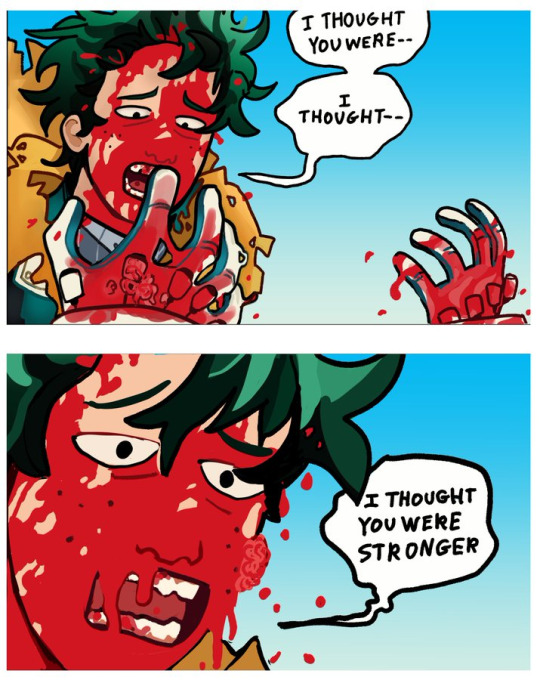
Art credit: @/charscounterattack reposted with permission.
INVINCIBLE VS. MY HERO ACADEMIA: WHEN HEROES KILL
Whether or not heroes should kill people is a hotly debated topic in comics.
There are people who think heroes should never kill, and others who think heroes should kill more. One of the most famous comic book storylines "Under the Red Hood" has Red Hood / Jason Todd debate whether or not it was ethical for Bruce to keep letting the joker live even after the Joker killed Jaso, especially after the Joker killed Jason. If killing the Joker earlier to prevent all future deaths would have been justified. There are like a hundred DC Aus that are like "What if Batman and Superman just started killing people?"
In order to explore this question I'm going to explore two situations in different comics, Invincible and My Hero Academia when the hero, a very idealistic young hero kills someone for the first time.
LET HORI COOK
Storytelling, especially for serialized storytelling which comes out week by week instead of all at once works on the premise of drawing people in by promising that certain future developments and plot points are going to happen. Stories are all about creating expectations, building them, and then paying them off.
Here's an example: The Dabi is a Todoroki theory has existed pretty much since the training camp arc. Horikoshi wasn't in your face about the hints about Toya, but there was just enough hints to make the theory seem more and more plausible. Toya having the same fire quirk as Shoto / Endeavor. Toya mentioning both of them by name. Shoto's two other siblings getting revealed but not Toya. Toya saying that Hawks should have paid attention to him most of all. All of these little pieces came together until Toya finally revealed his identity on live TV in front of both Shoto and Endeavor.
This worked because not only did it give the audience just enough clues that they felt smart for figuring it out, and get invested in the idea of Toya as a Todoroki, it also was well-paced so it didn't seem like Horikoshi forgot about it unlike the traitor plot which went hundreds of chapters without being mentioned. If Toya was revealed to be a Todoroki at the training camp arc with no buildup, it wouldn't be as effective bcause we didn't have years of waiting and theorizing. If Todoroki was revealed to be some guy named Steve after all the hints, it also wouldn't be an effective reveal because there were hints dropped for Toya Todoroki, but there were no Steve hints so it'd feel like the author lied to us.
Themes are like this too. I tend to explain story themes by oversimplifying it as "Question, and answer." The story asks a question, it provides us an answer, and we can come up with our own answer as well. However, there's a middle part I'm skipping out on which is deliberation. Before you can come up with an answer, you obviously need to deliberate it, either by presenting arguments for or against, hearing outside opinions or just thinking things through.
In other words, you need to "Let things cook."
If Toya calling Shoto by his full name at the Training Camp Arc is when we're first asked "Is Toya a Todoroki?" or when the theories first started, then the long middle period between Training Camp Arc and the First War Arc is the deliberation. This is when the story not only added more hints to the idea that Toya was a Todoroki, but also set up why that reveal mattered. Endeavor wanted to atone for his past sins, but one of his victims was no longer alive. Endeavor begins to move on anyway and think he's finally made himself a good hero, but now Toya appears to flip up the reverse Uno Card.
So let's follow this basic formula, for how ideas get developed in My Hero Academia and just any good story.
Question / Introduction
Deliberation
Answer / Conclusion
My Hero Academia and Invincible explore similar themes in regards to heroism, generational trauma and how to be better than the previous generation in both Mark and Deku. I'm going to streamline their arcs down to one basic question for the sake of time. For both the question is:
Can I be a better hero than my Dad?
Deku and Mark might be two characters who cannot possibly seem to be more different, but you can actually list off a lot of similarities between them right away. Deku and Mark are both people who in a world oversaturated with superheroes spent most of their childhoods with no superpowers at all. Also, they were genetically supposed to inherit a quirk / viltrumite powers, but Deku was born quirkless, and Mark was an extremely late bloomer. They are also people who while being powerless civilians for most of their lives worship heroes. Deku collects so much All Might Merch he even stole some from Nighteye after he died, Mark attends comic conventions even after he becomes a superhero.
They also grew up worshipping one hero in particular who was essentially earth's strongest hero, for Mark it was his dad Omni-Man, for Deku it was All Might. They also both get the opportunity to train directly under their favorite hero immediately after they get their powers. At first this makes it seem like they've been given everything they've ever wanted. All Mark has ever wanted was to be a hero like his dad and make his father proud. Not only did Deku just want one person to tell him he could be a hero too even without a quirk, but his very idea of heroism is built around seeing All Might always save people with a smile.
However, both of them suddenly hit complication just when it seems like they've been given everything they've ever wanted. They are both confronted with the fact that their heroes are not who they expected them to be. They are overly idealistic heroes who have been dreaming of being heroes since childhood only to be hit with a much greyer reality. To the point where there innocence becomes a flaw in and of itself. The way they've been coddled and protected all of their lives leaves them completely unaware and unable to spot the grey areas in the world, or the people around them.
For Deku the moral greys exist in the villains around them. In MHA Society, villains are basically just bad guys in suits for the heroes to punch on television. They're seen as a faceless enemy, and there's very little in way of rehabilitation for villains once they're captured. Deku lived in a very black and white world before this point, and he's suddenly presented with the idea that his villains could be morally grey.
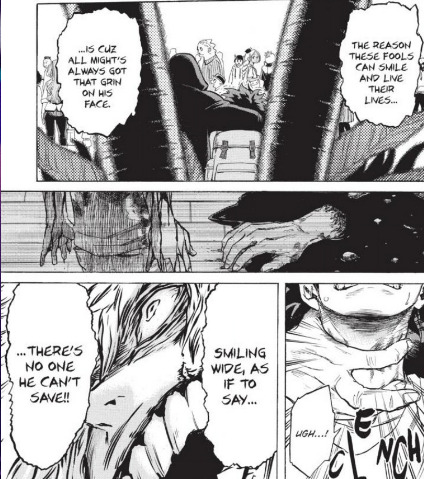
Deku's image of All Might is a hero who saves everyone with a smile, so he could never imagine that there are people who All Might has failed to save. He's never stopped to consider where villains came from, or if any of them might have legitimate reasons for their grievances.
This becomes a pretty central theme in MHA. It's first brought up here when Shigaraki talks about All Might acting as if there's no one he can't save. Twice brings it up again in his first backstory chapter, that the heroes only save the virtuous ones.
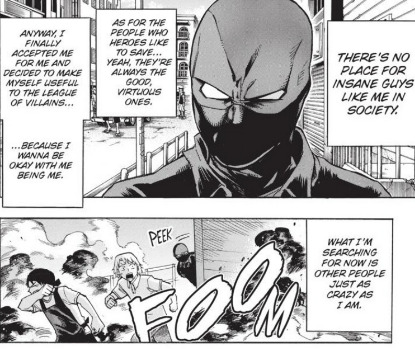
This is further enforced in the same overhaul arc with members who are loyal to Overhaul because they are society's trash who would have been thrown out otherwise. There is a group of people fiercley loyal to Overhaul who is a terrible boss, because he is the only person who would accept them.
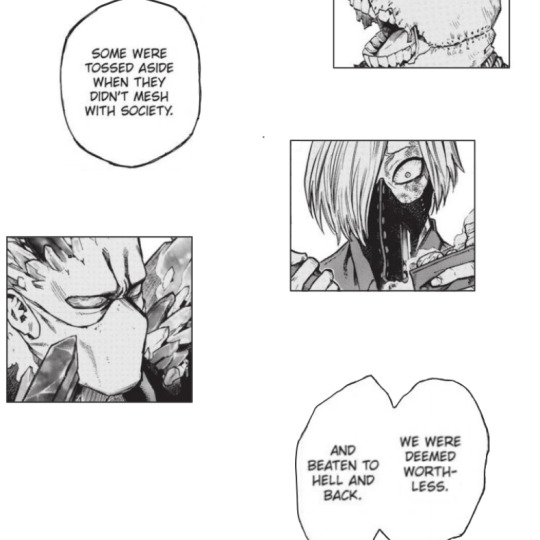
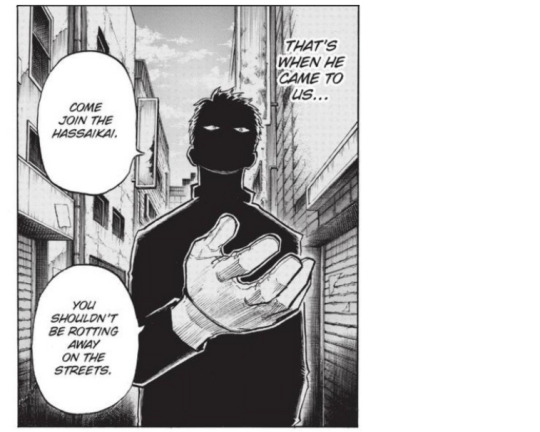
edits belong to @stillness-in-green from bring it all back a tone poem on returning to staus quo located here on ao3.
In the War Arc this long running theme basically reaches a climax with the Hawks and Twice confrontation, where Hawks decides to try to offer Jin a chance to restart because he's deemed him "good" but he won't extend the same helping hand to the league who Hawks has determined as "bad." He then asks Jin to betray his friends in order to be saved, something that Jin rightfully calls out.
That Hawks only wants to save Jin because he's one of the good ones, and he's written off the rest of the league and left them for dead. Hawks choosing to divide between good and bad victims ad only save the one he personally thought was worthy of redemption, makes it impossible for him to save Twice who would never under any circumstances give up on the rest of the league.
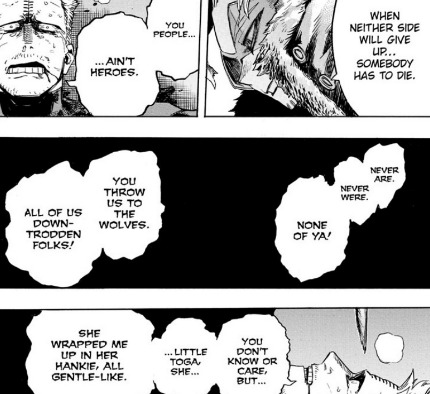
Twice's death is a tragedy, but it also presents us a clear example of the failures of the previous generation. Even a hero who sincerely sympathized with a villain and wanted to help them start over wasn't able to help them because of this attitude of selectively picking and choosing who to save. If the heroes only save the innocent the I guess the lives of the guilty are worth less.
This is the questio Toga poses to Ochako, if the heroes killed Twice then are you going to kill me in order to stop me. This is the central subject of Shigaraki's speech to the heroes. That heroes and villains will never uderstand each other, because the entire hero system perpetuates itself on ignoring the needs of societal outcasts and rejects in form of the "innocent people" and those outcasts who aren't having their needs met eventually turn into villains who get systematically put down by heroes. Heroes and villains are incapable of understanding each other and breaking the cycle, because the entire system isn't built on helping people, but merely maintaining the idea that heroes are perfect, faultless saviors so normal people will feel secure, while the people the heroes have failed get swept under the rug so society can keep "functioning."
"You heroes hurt your own families just to help strangers. You heroes pretend to be society's guardians. For generations, you pretended not to see those you couldn't protect. That means your system's all rotten from the inside with maggots crawling out. It all builds up, little by little, over time. You've got the common trash, all too dependent on being protected, and the brave guardians who created the trash that needed coddling. It's a corrupt, vicious, cycle. Everythig I've witnessed, the whole system you've built has always rejected me. Now I'm ready to reject it. That's why I destroy. That's why I took power for myself. Simple enough, Yeah? I don't care if you don't understand. That's what makes us heroes and villains."
So if the starting question is: Can I be a better hero than my dad?
Then everything I've detailed above is deliberation. Here we have, ever since the training camp arc, this slowly built up idea of why All Might was a flawed hero in the end.
Mark has to face the fact that his father is a more morally grey person than he could ever imagine, whereas Deku has to face the fact that the villains are more morally grey in his world, and that makes the heroes look more flawed in comparison as well. The deliberation is all slowly bringing Deku to think over what Shigaraki asked him all the way in the beginning in there first meeting.
Were there ever people that the heroes couldn't save? If so then what are you supposed to do with the victims you can't save after they grow up? This is when Deku begins to start forming his own answer.
Deku hears the advice of both the other OFA users, and The Stinky Old Man (Gran Torino) that killing Shigaraki is the best option, but wants to explore other options.
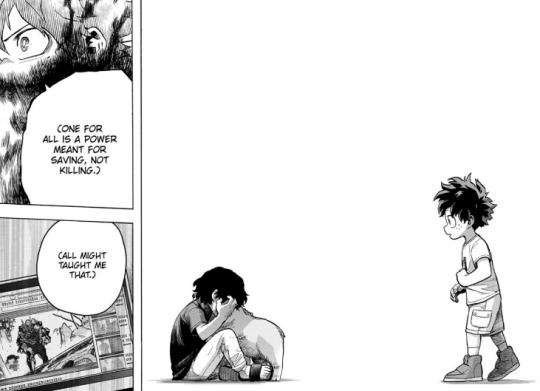
Scenes like this clearly telegraph what the answer / conclusion Hori is leading us to to be. The same way that Toya is a Todoroki is foreshadowed long in advance, statements like "All for one is a power meant for saving, not killing" clearly set up Deku's Endgame. Deku's end goal is to find a way use his power to save Shigaraki rather than killing him. Everything else is just a matter of deliberation, Deku knows what his edgoal is but the chapters between then and the end of the manga is Deku having to figure out how exactly to save Shigaraki without killing him.
You Heroes Hurt Your Own Families Just to Help Strangers
Invincible is the story of Mark Grayson, the son of Omni Man / Nolan Grayson. He's been told all of his life that his father is a viltrumite, a race of benevolent aliens who send out people like Nolan to alien civilizations in order to uplift their entire civilization. Which is what led Nolan to come to earth and become Earth's greatest heroes.
This turns out to be a big fat lie when within 12 chapters Nolan not only slaughters the guardian's of the globe, but also has a confrontation with his son.
Mark has wanted to be just like his dad his entire life. Only to be slapped in the face with the realization he's known nothing about his dad his entire life, shown rather brilliantly by these panels where Nolan tries to have a normal father / son conversation with Mark while covered in blood.
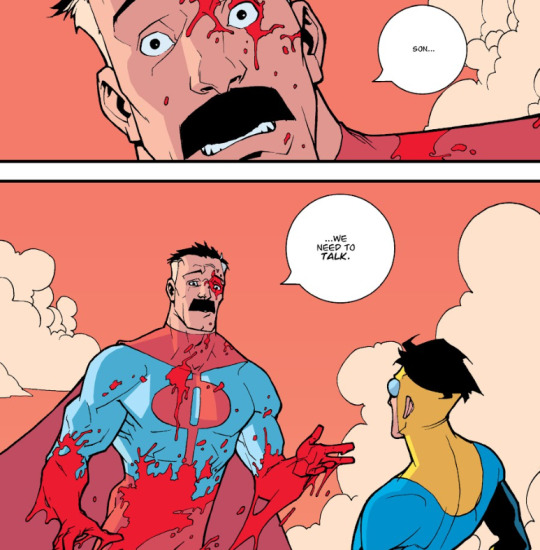
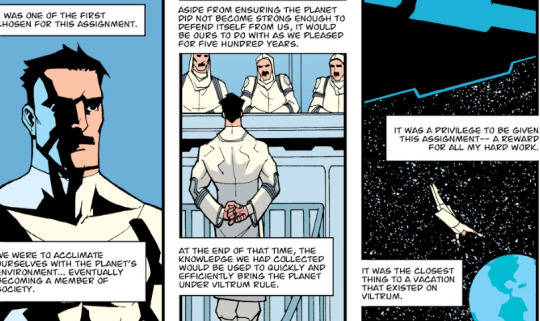
Nolan isn't from a futuristic utopia but from a brutal, fascist space empire. He didn't come to earth to help bring it up, but to weaken its defenses and make it prime for conquering. He didn't have Mark out of love, but to produce another soldier for the viltrumite empire.
Mark's entire schtick is that he's invincible, but he's so inexperienced as a hero that he gets beat up constantly despite the fact he has the strongest power set in the series b/c he has viltrumite powers. However, not only does the series introduce moral greys by continually showing how Mark even with the best power set in the series constantly gets his ass kicked, it also challenges Mark's black and white thinking and hero worship of his father by showing him the kind of man his father really is.
Mark has wanted to be exactly like his father his entire life, but now that's suddenly a bad thing. His father is a morally reprehensible person and Mark is now a descendant of an alien race meant to conquer worlds. Not only is Mark confronted by who his father really is, but now everyone in Mark's life judges him by comparing him with his father.
Mark has to work with Cecil and be his on-call Superhero, both to be able to pay for college, and also to prove that he's not his dad. The unspoken part of the agreement is that Cecil gets to keep a leash on Mark and Mark has to prove that he'll never turn out like his father to earn Cecil's trust.
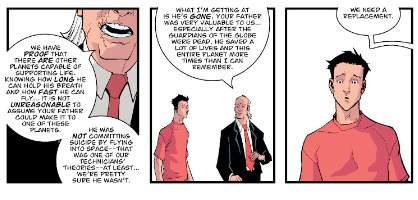
Cecil is automatically suspicious of him because if Mark were to turn evil, the planet would have no defenses against him just like it didn't have any for Omni Man. Mark's mother starts to drink and blames Mark for Omni-Man leaving in a drunken moment of weakness because of how much the information that Omni Man only regarded her as a pet affected her.
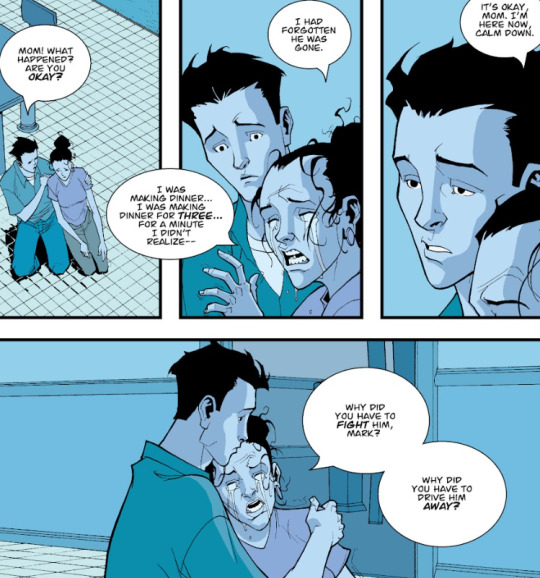
The comic even shows us that in most alternate universes, mark actually did make the decision to join his father's conquest, and this universe is one of the few exceptions. This is also where we're introduced to a major reoccuring antagonist in the comics, and also the main antagonist / final antagonist of season 2 of the cartoon Angstrom Levy.
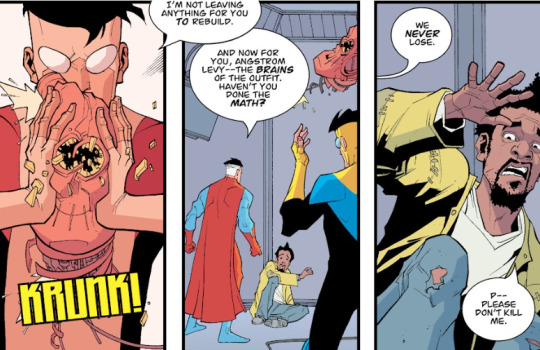
Levy is someone who can jump between dimensions and has traveled to almost all of them collecting his alternate selves. He has witnessed for a fact that in most universes Mark sides with his father instead of fighting against him.
Levy enlists the clone bros to build a device that would combine the knowledge of his alternate selves into one individual. This device ends up breaking tragically (partially mark's fault, but levy himself made the decision to stop the machine in order to stop the clone bros from killing Mark). Levy's memories become confused as a result of the machine malfunctioning, and he can't tell the difference between himself and his alternate universe counterparts. This means that Levy now remembers several alternate universes where Mark did turn evil, and remembers them as if they happened to him.
It's better elaborated upon in this post:
The process by which Invincible has had to condense and consolidate the plot beats of the original comic, coupled with the opportunity it's granted the writers to tighten up and emphasize its themes on a second pass, has resulted in a newfound appreciation for how unbelievably fucking good Angstrom Levy's whole character concept is. What's that, Mark? Your main emotional crisis this season is your fear of turning out like your father? Here, have an archnemesis who's out to kill you because his memories were inadvertently overwritten with the lived experiences of hundreds of alternate versions of himself whose friends and families were slaughtered in worlds where you did, in fact, turn out exactly like your father. Because it turns out that that is in fact the multiversal norm. That you turn out like your father. And now you're left to wonder what set of arbitrary coinflips pulled you back from that abyss in this dimension, and whether your luck is going to continue to hold into the future.
Mark is not only hit with the revelation that his father isn't as good as he thought he was, but also while he's in a crisis about about whether or not he will turn out like his father, he learns the answer is yes, in several dimensions he turns out exactly like his father.
In My Hero Academia there are families like the Todoroki's who balance the difference between a hero's obligations to society, and a hero's obligation to society. However, that's a side plot where I'd argue that the main plot for Invincible and it's main focus is what Mark owes to the world as a hero, and what Mark owes to his family.
It's not just that Omniman is trying to invade earth for the Viltrumite empire. It's not just that he failed as a hero, but that he failed as a father. What makes Mark snap, is hearing Omniman call Debbie a pet. Until that point Mark was in denial and still trying to reason with his father.
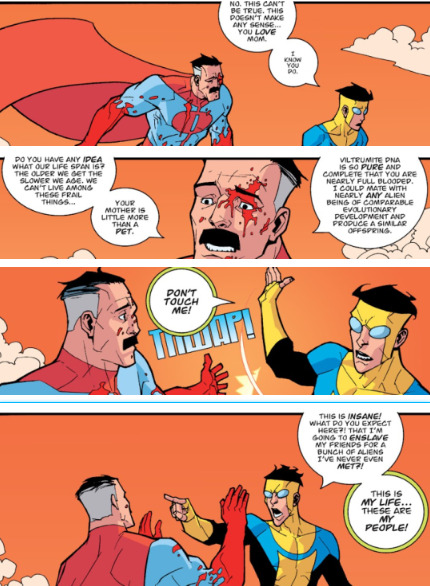
Invincible is about two intersecting themes: Is Mark obligated to use his incredible powers to help make the world better? Can Mark be a good hero and a good family man?
While MHA has more far reaching societal implications in its themes and questions, Invincible is more specifically about the Grayson Family. It's generational trauma on a society level, vs generational trauma on an individual level. The way Nolan was raised on Viltrumite effects how he raised Mark causing their conflict, and Mark's conflict with his father effects most of his young adulthood when he's trying to figure out what person he wants to be (read: not his dad), but also the way he parents his daughter with Atom Eve.
Omni-man failed Mark as both a hero, and a father. Mark feels the need to overcompensate for what his father did the world and all those innocent people by acting as Cecil's lapdog and doing whatever Cecil tells him.
However, Mark is much more hurt by the personal betrayal than he lets on. It's not just that his father killed a bunch of innocent people, it's also that Mark's father failed as a father, abandoning both him and mom and choosing to be a viltrumite rather than being Mark's father. Mark's stated reason for wanting to be a hero post the omni-man reveal is to prove he's not like his dad to the world, and also make up for the innocent lives he failed to save. However, his unstated underlying reason is Mark is hurt and betrayed his father didn't put his family first, and this causes Mark to always put his family first.
This leads to two insecurities / narrative flaws. One, Mark is insecure about becoming like his father so he tries to prove he's nothing like him by being the most selfless, perfect hero possible. Two, Mark is hurt by being abandoned by his father and doesn't want to become a deadbeat like Nolan so he gets extremely overprotective of his own family.
These two things are obvious in conflict with one another: A hero has an obligation to the common good which sometimes means sacrificing time with your loved ones. However, being a good family man requires a level of selfishness that directly contradicts the selfless hero that Mark is pushing himself to be. In the comic the way Mark prioritizes his family and loved ones over the common good and justice is made even more obvious. His first instinct on seeing Omni-Man again isn't to call him out for being an awful father, but to hug him and ask him to come home. Mark is a distraught son first, and a hero second.
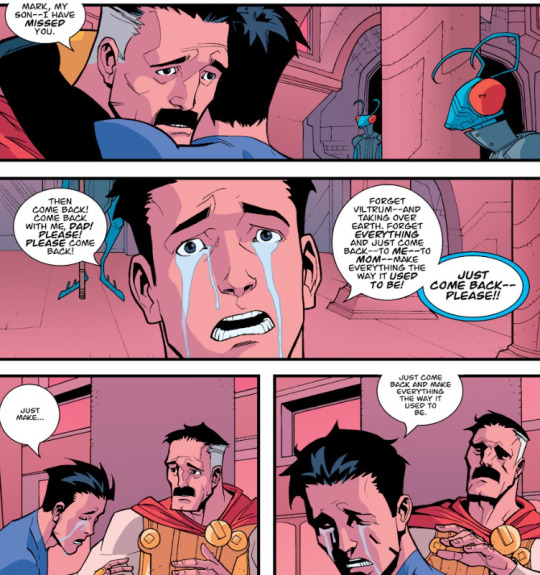
Mark has two flaws, his fear of being like his father makes him try too hard to be a perfect hero, and his trauma over losing his father makes him prioritize his family over being a hero. It's very much a having your cake and eating it too situation, oftentimes heroes make huge sacrifices for their personal lives in order to be heroes, that's basically a theme discussed in the comic with Nolan being absent for a lot of Mark's childhood, and why Mark's relationship with Amber fails.
The show also introduces us to the idea that Mark is so afraid of becoming like his father that he deliberately holds back his punches. Which is good when he's fighting earth villains, but bad when he's facing viltrumites who can only survive being disemboweled, but will also come to wipe out all life on earth if they're allowed to live. In the show it's directly mentioned that Mark is holding back, in the comic it's implied when we see how helpless Mark is in the fight against other viltrumites. Mark lacks the resolve to kill someone and when fighting a viltrumite, failing to put them down can have consequences because they are galactic conquerors who will not show you any mercy.
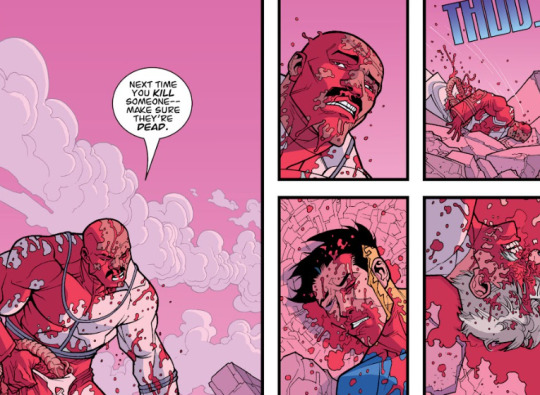
This all comes to a head in the Angstrom Levy fight where Mark makes his first kill on-screen when beforehand he'd never fought to kill before, and even held back against galaxy conquering aliens who were out to murder him and his dad.
However. before we begin that.
Should superheroes kill?
People often act like whether or not super heroes should kill their villains is a black and white topic, where it actually depends highly on context.
Batman’s an entire character is written around how he wants to redeem Gotham and save the city, most of his villains aren’t even sent to prison they’re sent to Arkham a facility that’s supposed to rehabilitee the mentally ill so they can rejoin society. Batman has decided it’s his place to stop crime, not his place to decide whether or not people have the right to live or redeem themselves.
Batman is also at risk for being just like his villains, that’s why he’s foils with Harvey Dent, someone who tried to prosecute people under the law who then snapped and went full violent mobster vigilante. Batman actually is at risk for walking the same path as Harvey if he decides murder is an option.
In X-Men 97, there was a character known as Rogue who dropped Simon Bolivar Trask off of a building in an act of vigilante justice. This action makes sense in context for several reasons. One Rogue was raised by Mystique and Destiny, is a former member of the Brotherhood of Evil Mutants, and began as a terrorist in the comics. She's not really a "moral highground" character like Batman. Two, Boliver Trask built a giant killer robot that resulted in the deaths of millions in Genosha which Rogue is a survivor of. Number three, Trask had no sympathetic reasons for building the genocide robot, he built the sentinels out of bigotry to wipe out mutants. He's not a victim in any way, he's an oppressor facing consequences for his actions.
Batman shooting Harvey Dent, his former best friend, a victim of severe mental illness and trauma that still has hope for recovery, and Rogue dropping the guy who made a genocide robot off of a building are both wildly different situations.
So in the context of MHA we have Shigaraki Tomura, a terrorist who's goal is to destroy japan enough that it will dismantle the hero system for good. Shigaraki Tomura is a ten year old child who lost control of his quirk and killed his family for mistake, he wandered for days in crowded city streets but not a single hero stopped to help him, then he was found by the main villain of the story and groomed for ten years into becoming his successor. Shigaraki is also surrounded by a group of societal outcasts who were failed by society in similiar ways, so Shigaraki knows he wasn't the only one failed by hero society and he starts to wage his war for their sake as much as his own.
In Invincible we have Angstrom Levy. Angstrom is not plotting mass murder the way that Shigaraki is. He is specifically only targetting Mark Grayson's family for revenge (at least the first time he showed up, the second time during the invincible war arc was different). Angstrom's revenge against Mark Grayson is misplaced, but to be fair the accident messed with his brain hardcore and he doesn't remember clearly what happened. He doesn't remember that he's the one who decided to stop the machine in order to help Mark. It's tragic. Angstrom also has the memories of like hundreds of different universes of evil Marks. Even though he's the victim of a tragic accident, he's also a victimizer in that he doesn't choose to just go after Mark, he deliberately picks Mark's family, his mother, and his infant little brother as a way of hurting Mark.
So both of these characters blur the line between villain and victim, but neither of them are like Trask in that they have no sympathetic motivation whatsoever. Shigaraki's actions don't come from bigotry, and he's not an oppressor. Trask was actually trying to do something good before his machine broke and his brains got scrambled, and now he wants personal revenge and to blame all his problems on Mark which is petty yes, but not on Trask's level of heartlessness.
So, there's a case that can be made here for both of them that there's room to save them. After all Mark and Deku aren't killers to begin with. Mark especially has an incredibly vested interest in not becoming a killer. Even if they don't explicitly go out of their way to save and redeem these two people, we're still at this point expecting the heroes to at least take down these two sympathetic figures non-lethally. Mark doesn't want to be like his dad and Deku has said explicitly he wants to save Shigaraki, and that OFA is a power for saving and not killing.
Also to sidestep this argument before people comment on my post with it.
What do you expect the heroes to just let a mass murderer live?
YES!
It happens in comics literally all the time.
Magneto, Wolverine, Jean Grey / Phoenix, Emma Scott, heck, OMNIMAN himself, all characters who have killed lots of people and all characters who get to live and even be on the heroes side. Of these three Jean Grey of all people has the highest body count.
Shonen Jump also has Vegeta. Have you ever heard of Vegeta? Most popular Shonen Rival of all time? Omni-man and Viltrumites are basically just Saiyans.
In real life they wouldn't let a mass murderer walk away but comics are not the same as real life. That's why characters are always punching dinosaurs all the time. Fun fact, if you were to try to punch a dinosaur in real life it would probably hurt your hand. I would advise against it. Dinosaurs are for the most part much stronger than human beings.
As I outlined above Shigaraki and Angstrom are different characters than Trask. They might all be murderers, but the first two have sympathetic elements and are humanized, they are victims of oppression (Angstrom's been killed by viltrumites in a whole bunch of worlds) whereas Trask is an oppressor.
So for both of these stories we are not expecting to see Deku and Mark kill their final villains (for the series and for this season). Deku because he's spent the final third of the series trying to work out a way to save the villains, and Mark because he doesn't want to turn out to be a violent murderer like his father so he's trying to be the most selfless, most perfect hero ever.
I THOUGHT YOU WERE STRONGER
So we finally reach the scenes in question and I thought I'd compare them without much commentary, just highlighting what happens without adding much spin.
So the final episode of Invincible Season 2 and Issue #33 of the comic is where Angstrom and Mark have it out. Angstrom appears in Mark's home and threatens his family. he brings up the comparison between Mark and his father right away. This is also something Angstrom has seen first hand by traveling to multiple universes where Mark has sided with his father.
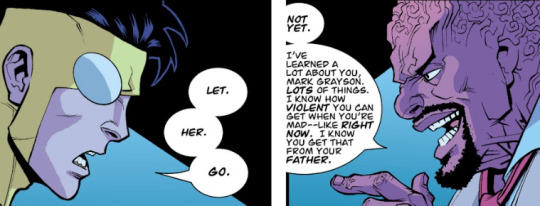
In the cartoon he's a lot more confused because he's constantly remembering other universe's memories as if he were his own so he genuinely thinks he's taking down an evil viltrumite, in the comic he's being more petty and blaming Mark for his deformity (I think he doesn't remember that he was the one to take the helmet off by choice). In both versions he uses Mark's family as hostages to keep him from fighting back as he tries to send Markk to his death in several different realities.
Angstrom then ups the threat of violence from holding them hostage to threatening to kill them. In both the show and comic he brutally breaks Debbie's arm. Mark is sent through several more realities, only to discover that Debbie's arm is broken and lose his temper.
Mark and Angstrom's fist fight comes to an end, and while Mark has him on the ground he keeps hitting and hitting and hitting long after Angstrom stopped fighting back. Which is what prompts the famous "I thought you were stronger..."
Now, in this situation it looks pretty justifiable that Mark attacked Angstrom so aggressively,. it was self defense for one against a man trying to kill him and he only got truly aggressive after he saw his mother's arm get broken. Not only that he didn't intentionally kill Angstrom, you can argue he went too far in a case of clear self defense. Other people even tell Mark that this one isn't on him, including Cecil who compares Mark to his father the most.
Then, why is Mark so disturbed?
It's because this....
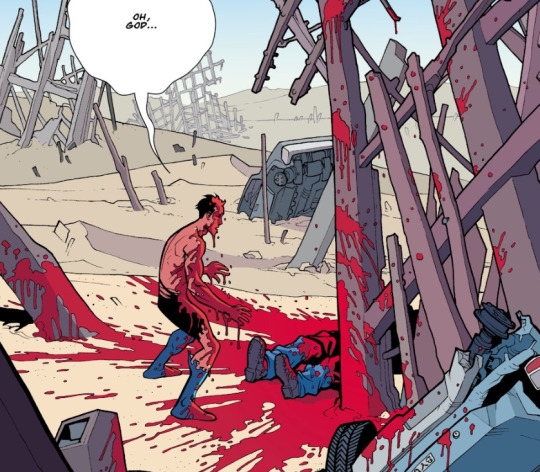
Is a deliberate parallel to this...
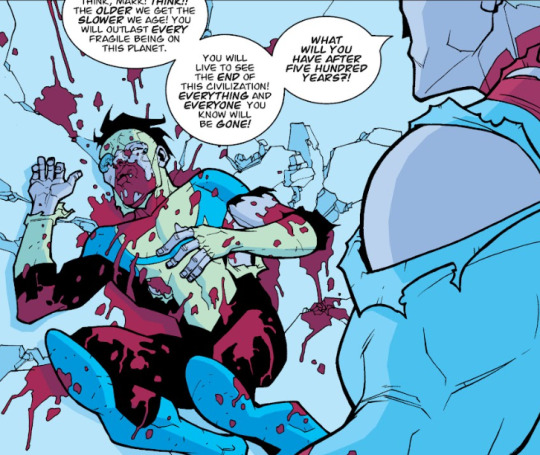
It's not just that Mark killed a man, it's that he killed a man by pounding on him relentlessly long after he'd stopped fighting back the exact same way his father did to him during their fight.
There's a difference between Mark say, fighting against a viltrumite and making a deliberate decision to kill them because of the danger that viltrumites represent to other people considering they are planet conquerors, and Mark killing this man because he lost his temper and couldn't control his own strength.
Mark spends the entire season trying to not be like his father, only to see first hand that he's capable of the exact same violence that his father is. The last episode of Season 2 summarizes this moment pretty perfectly in a montage of season 1 moments while Mark screams and breaks the sound barrier trying to push his viltrumite powers to their limits.
Mark: I'm strong enough and I can do this. It's all I've ever wanted for as long as I can remember. I want to do what you do. I want to be just like you. Omni-Man: You will be, son. You will. Mark screaming. Omni-Man: You'll outlast every single fragile being on this planet. You'll live to see this world crumble to dust and blow away. Everyone and everything you know will be gone. Mark screaming. Cecil: You know who else said that to me? Mark: I'm not my dad. Mark screaming some more. KRegg: Your father will be execute and you can return to earth. You will assume the mission to prepare earth for our rule.
So not only is Mark hit with the realization that he's just as capable of being violent and angry as his father is. He also is being forced by the situation to become more violent out of pragmatism, because if he doesn't get strong enough to fight viltrumites then they're going to come to his planet and take everything.
Not only has Mark lost some of his innocence, he's also being forced to throw the rest of it away. It's why Mark drops out of college at the end of the season because any pretense of balancing between his human life and his duty as a hero is gone. He is basically forced to be a viltrumite full time now and will abandon any semblance of trying to live his own life for a very, very long time until his relationship with Eve starts to get serious.
Which is why a pretty justifiable murder in this context is presented as so bloody, gruesome and traumatizing an event for both the audience and Mark himself. We both know there's no coming back from this.
As for the death of main series villain Shigaraki Tomura, Deku ends up being forced to kill Shigaraki in a situation similiar to Mark. Though I will highlight one difference right away. Mark was trying to reason with Angstrom, but he was at no point like "I want to save Angstrom, he's a victim I want to find some other way of ending this bloody conflict between us." Mark just didn't intend to go so far as killing him.
Deku entered the fight with the explicit stated desire to save Shigaraki rather than killing him, which would make him different from the previous generation of heroes because he wouldn't turn a blind eye to society's faults and victims like Shigaraki accused him of.
Deku makes a journey into Shigaraki's mental landscape to find Tenko in a recreation of the memory of the day of his worst trauma. As Tenko's quirk activates, Deku attempts to grab the little boy's hands to comfort him.
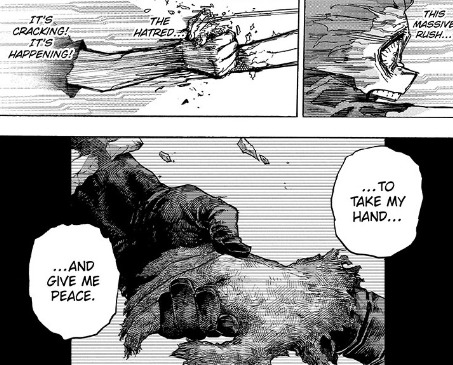
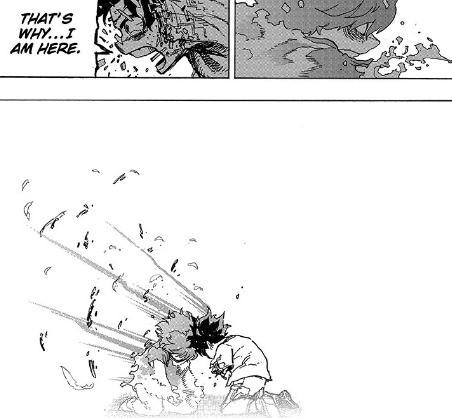
Deku's "Why I am here" is markedly different from All Might's. Deku says the reason he wants to save others is to take their hands, comfort them and give them peace, whereas All Might as the strongest hero tried to keep peace by beating all the villains down. Deku's way to become the greatest hero once again, focuses heavily on saving others, and offering his hand to everyone without hesitation instead of picking and choosing who to save like previous generations.
Deku even says that he has to extend a helping hand to everyone because he's learning that the world is more complicated than he thought, he was ignorant to a lot of people's suffering, and he can't sweep their pain under the rug anymore.
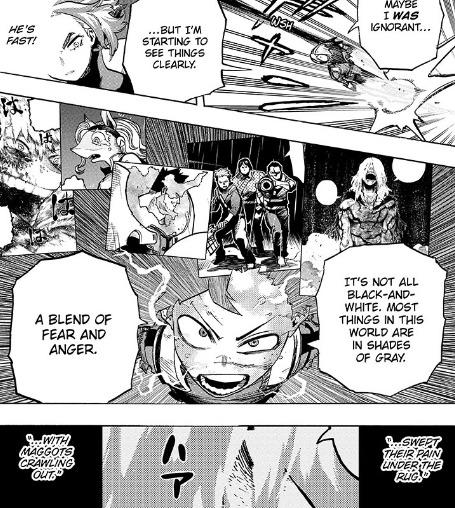
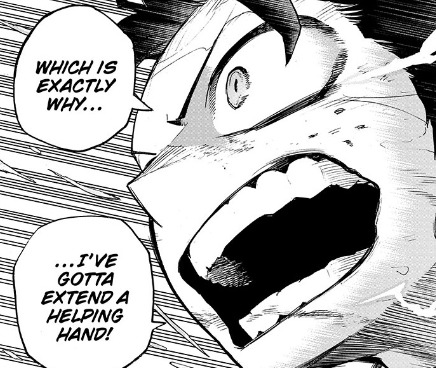
For a moment Deku unconditionally extending a hand to Shimura Tenko even as his mental body begins to decay away wins over Shimura Tenko. Though Shigaraki also resists because much like Twice he doesn't want to abandon the rest of his friends even if it means he personally will be saved.
However, any attempts to save Shigaraki are interrupted by AFO suddenly appearing out of nowhere and taking control of Shigaraki's body yet again.
At this point Deku does exactly what Mark does, which is relentlessly punch Shigaraki's body to death in order to kill AFO along with Shigaraki. In some small defese Shigaraki was also there too punching AFO in his mental landscape so he was assisting Deku in defeating AFO he wasn't helpless the entire time.
But, basically we see the same scene happen with Mark.
A hero who does not wish to kill is forced by circumstance to kill a villain. In Deku's case it should be even more devastating because they explicitly went into the fight wanting to save Shigaraki and they believed their power was for saving and not killing.
Yet, we don't get nearly as horrified a response from Deku.
However, instead Deku's final words are just about how he couldn't forgive Shigaraki and had to put a stop to him no matter what.
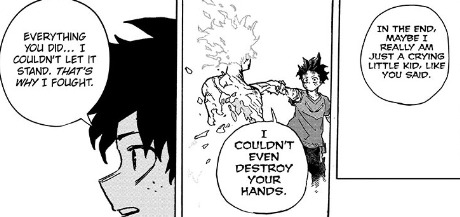

Even the way the scenes are presented to us are entirely different. Mark punches Angstrom in a wasteland a dry, dead place, until he's soaked in Angstrom's blood, and painted everything around him red. Once again, it's a visual callback to Mark's father beating him half to death, which was Mark's own lowest point.
Whereas, when Deku punches Shigaraki until he disintegrates not only is the violence or horror of Shigaraki's death not acknowledged, but it's played as a triumphant moment where the clouds clear from the sky and the stun starts shining.
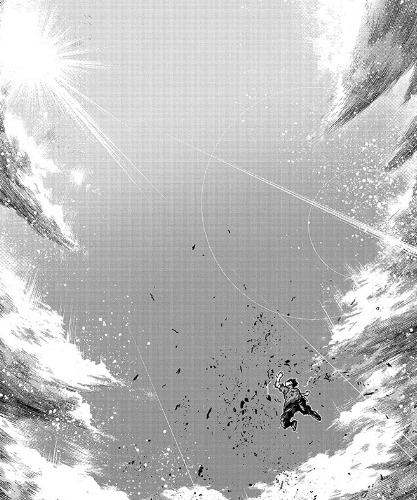
In the cartoon Mark killing Angstrom leads to a total screaming breakdown where he has traumatic flashbacks of his dad beating him and pushes himself to break the sound barrier multiple times. It also leads him to making big life changes like dropping out of college to become a hero full time and giving up any pretense of having a normal life. As seen in a scene where he watches Amber from the sky, and is tempted to go down and greet her and just flies off, because Amber represents his connection to his humanity.
Also, Angstrom doesn't even die. He comes back way worse and that's how invinicble war arc starts.
In the aftermath of killing Shigaraki, Deku gets melancholy about not being able to save Shigaraki only to be reassured he did save him in the end. Only to be told by All Might that it's okay because he still saved Shigaraki's heart even if he killed him.
DEKU: "I couldn't save Tenko's life." "I reached out to his heart, and even though his hatred was crushed," "to the very end, Tenko" "was the leader of the League of Villains." ALL MIGHT: "Let me tell you this as someone who has had a near-death experience," "I think it's in the expression on his face at the end." "If there wasn't a crying boy there," "I think his heart was saved after all,"
People also try to convince mark that he did nothing wrong and that there was no helping what he did in a situation like that, but he doesn't let himself believe them.
The ending lines about the last episode of Season 2, are this:
Eve: I'm sorry Mark. It's not fair. You don't deserve this. Eve: You don't deserve this.
Which has a double meaning. Eve is just trying to comfort Mark, because arguably he shouldn't have to feel guilty for fighting in self defense. On the other hand what Mark hears is You don't deserve this in the context of Eve's feelings for him. An alternate timeline version of Eve confessed her love for Mark. Mark was about to bring it up but decided not to. At that moment as Eve embraces and comforts him, what Mark hears because of his own self loathing is that he doesn't deserve Eve comforting him, or her love for him.
Just to clarify I don't think that Mark is crying over Angstrom Levy specifically. In fact over time he's painted to be pathetic in his obsession with revenge, and what he amounts to is just wanting to blame everything on invincible when it was partially caused by his own actions.
However, it's inarguable that killing (or rather seemingly killing Angstrom) deeply impacted Mark and how he saw himself as a hero. It's less about Angstrom, and more about the loss of control, and the realization of how powerful his anger and hatred can get and what that means for him personally.
It also shows us where Mark's priorities lie. Mark wants to be a perfect hero and a perfect family man, and Invincible shows us he can't be both, his desire to protect his family leads him to staining his blood when he was trying so hard to be a good, selfless hero. This is all a part of a deliberate arc where Mark chooses more and more to value his family over being a hero. I'm not going to say whether or not it's the right choice, but it's a choice he makes, as a part of his character development where as he grows up and becomes a father his priorities change.
My point is that this moment has an impactful change on Mark, for arguably the rest of the comic.
Now my question is, with My Hero Academia will the death of Shigaraki Tomura, the series greatest villain and it's greatest victim have an equal impact on Deku's character that Levy's death did on Mark's?
#bnha 424#bnha spoilers#invincible#mark grayson#deku#izuku midoriya#mha 424#mha spoilers#omni man#bnha meta#mha meta
323 notes
·
View notes
Text
I loved all of what Sarah highlighted in her interview today and I'll elaborate a bit especially on the romance part:
In Maas’ fantasy worlds, love interests often exist as fated “mates,” with invisible strings between them that are powerful and often poetic. Readers can see the literary metaphors, like complementary powers between two characters. But other times, there are no metaphors, with their connection initially seeming random.
She's too attached to the mate trope and I like that she gives us different cases and scenarios for it, otherwise it'll be boring.
“Sometimes, I will write a scene with two characters that I’ve planned for them to get together, and then they have no …” She shakes her head slightly at me. “It’s like holding two dolls and being like, now kiss! And they won’t. … And then sometimes a different character will walk in and they will just” — she snaps.
I yelled at this part because it's as if she plucked the scene from Azriel's bonus chapter and used it as an example. Those parallels between Elain and Gwyn are intentional. It doesn't mean Elain is bad it's just their dynamic doesn't work as a couple and it was obvious to the author. I know she didn't specify who this was about but like, come on, who tried to kiss and which character showed up in a bonus chapter after that depressing scene and gave a glimmer of hope?
“It feels like magic in a way where, as much as I tried to plot out things years in advance, I let my characters guide a story. And they usually wind up with the people that they need to be with and who offer them the most growth and joy.”
I love this so much and allow me to speak about my favorite ship and its because the snippets we saw of Az and Gwyn together especially in the bonus chapter brought out a lighter version of Az. His scenes with Gwyn were light-hearted and the bonus chapter ends on a hopeful note for them. It's hard to deny that connection between them whether you theorize she's luring him or they're mates, those theories wouldn't exist if she had no ties to him (she's in his own chapter like come on).
I go the philosophical route with my next question: We’re talking about fate here, but at what point is a character the agent of their own fate? What happens if someone rejects their mate? (Listen, if I were Fae and I didn’t like my mate, whatever God chose for me is not my business.)
People are jumping the gun and assume this example is set to be Elucien but... we have Helion and Lady of Autumn likely being an example of a tragic rejected mates story (if you read ACOWAR and their history it's obvious they're mates). Maybe it's Mor and Eris and that's the secret that ties them to each other. We have other characters from other series too.
For a convincing mate rejection story in my opinion, it needs more than one book or it's a case that we see with side characters where we can see their history and the long-term implications of a rejected bond.
It's too easy of a story to have one person's central conflict be the words "no I reject you" and they're done. Again, this is not exclusive to ACOTAR but also her other series.
“That’s something I find to be very interesting,” she replies. “What if the forces that be put you with the wrong person? Or what if you just decide, eh, I’m not interested. … There’s a lot to explore within the concept of mates and your agency about it.
The concept of agency is something many readers in the fandom discussed especially when it comes to mating bonds and there were arguments on (would Rhys fell for Feyre if she wasn't his mate or would have Cassian fell for Nesta if she wasn't his mate). We know that some mates don't work out but stay together because their dynamic is unhealthy (Rhys's and Tamlin's parents). We got examples of a loveless mating bond already.
We also saw that Nesta didn't immediately accept the term "mate" because it would mean cutting off her last tether with humanity. It's not a matter of "you're my mate" "yes I'll be with you", the dynamic between the mated couple is important to explore.
“I’m not going to say if I am exploring it in future books or not,” she continues, “but it definitely offers a wealth of things to explore with this concept of freewill and what is true love. Is it something that’s destined? Or is it something that you make? Is it both?”
This part aligns with what I think about Elucien. We never had a mated pairing who knew they were mates but are not in love with each other. Every mated couple found out they're mates when they were already in love.
Can a destined love turn into true love? Or do you settle for a destined love without love being in the equation. Love wasn't in the equation for Rhys's parents, but love was the equation for Feysand and Nessian. Elucien was left unexplored for a reason and both Elain and Lucien view each other by label "mate", they didn't have a chance to get to know each other. So it's going to be very interesting to see them navigate their feelings for each other despite the mating bond.
I didn't expect her to elaborate a lot on this but I love that she did and I hope in future interviews she gives us more good bits about her writing and examples of the decisions she took for some characters and couples.
Didn't expect this post to be long but happy reading! I'm still reeling from HOFAS 🥲
318 notes
·
View notes
Note
I so want to know more about the nature of vampire bond as well. Especially on the maker's end. Louis didn't get to open up on it more but I could feel the weight of it.
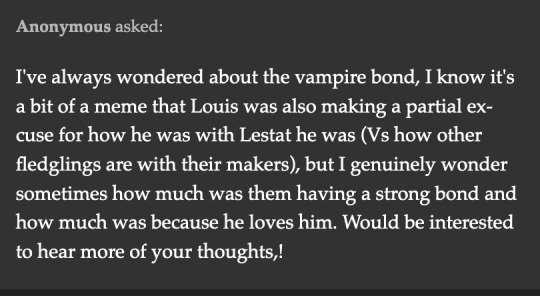
(You guys saw my tags on the gif set, didn't you^^)
Okay, so... the vampire bond.
The vampire bond in the VC is not binding. It does not make slaves out of fledglings. It does not enforce anything.
It does mute the mental connection between maker and fledgling, though Lestat theorizes in later books that they might be simply running interference, because they're too close (in the blood).
A bit of lore:
The vampires in the VC were initially created by a spirit (Amel) fusing with blood (Akasha's). This fusion causes the cells to mutate, that is where the blood hunger comes from. The mutation turns the cells more and more into luracastria, a kind of plastic. That's why their skin goes more pale over time, too, and turns translucent when they're killed and the blood is removed. (But that just as a note)
This spirit, Amel, is like a gigantic web. When a vampire makes a fledgling, they pass on a "tendril" of Amel with their blood. The blood itself already would transform, but since Amel is in the blood...
So that is... the literal "vampire bond".
But... that isn't what Louis is talking about :) Or, I sincerely doubt that is what he talks about^^.
Louis... elevates the "vampire bond" to a status that defies mortal definition. No equivalent.
"It's a bond that can never fully be severed. A bond like that makes you believe there are only two of you on the planet."
True. It can only be severed by death, because of the tendril that connects them. But that is not why he thinks there's only two people on the planet :)
I think Louis used the "vampire bond" for himself as an excuse. As a shield. He held it before his heart, telling himself he felt like that because of it.
But then, why didn't Claudia feel like that? Or Antoinette?
Which brings us to Louis cutting open his veins after Madeleine, and the scene in the restaurant.
The show gave us an extremely beautiful and harrowing little glimpse at the bond there, and I love it, even though it is extremely bitter.
Because by turning Madeleine... Louis realized that the "love" did not come with the turning, nor did his heart beat in sync with hers. He realized that he was now connected to her, yes, but he did not want to be. He did not want to feel the feelings Madeleine felt for Claudia. (And which likely echoed what he and Lestat had shared before!) He did not want to be reminded of what he would never have again. He did not want the connection.
And so he wanted to be rid of it, he opened his veins, in vain, because the tendril... had already been passed on.
The vampire bond is for Louis this mind-altering and literally life-altering experience of being reborn through marrying Lestat. Kissing Lestat on the altar. Meaning it. That is why the floor always feels liquid. That is why their hearts sync up. That is why the emotions coming from Lestat always managed to reach him, and why it felt like it was only the two of them.
It was not the same for Claudia.
That was also something Louis realized there, I bet.
Also.
He likely felt Lestat "die" in 1x07. Just as Lestat... likely felt him suffer and slowly wither when Louis was locked up after the trial.
And Louis felt Madeleine's death.
And he knew Lestat felt Claudia's.
In the VC... and imho in the show... fledglings are made from different intents, which shapes the relationship. I talked about that a bit here. A fledgling, a turning does not equal the "big love"...
But if it does... then it fuses obviously with that love. And elevates the bond to an experience that Louis... obviously does not want to sever. And misses, terribly.
#Anonymous#ask nalyra#amc iwtv#iwtv#amc interview with the vampire#interview with the vampire#lestat de lioncourt#louis de pointe du lac#loustat#vampire bond
124 notes
·
View notes
Text
📎 YOSANO AKIKO ANALYSIS
UNDERSTANDING & ANALYZING BUNGOU STRAY DOGS YOSANO THROUGH THE LENSES OF THE REAL YOSANO AKIKO'S LIFE
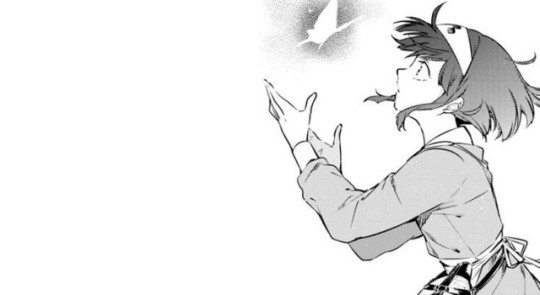
WC. 4,000
DISCLAIMER: I am no historian or literary expert I am just obsessed and mentally unwell, if u cannot tell, teehee <333 If this will ignite any hate or hostility (not this post’s intention), please set your sights elsewhere and just scroll. I made this because I love her character and BSD in general to a bone-shattering degree. I hope you have as much fun as I did while researching and writing this, enjoy!! (also English is not my first language forgive me for any grammatical errors ty)
There might be a part two for this, but for now, this is all my tiny brain could offer >:))
IMPORTANT NOTE: There will be a lot of omitted, summarized information that has been subjectively extracted or abridged. This is not a complete, rich historical account but research done to make connections and parallels to better understand and theorize about BSD Yosano’s character. I did not finish reading the entire biography, which is why this is only the first section of a bigger whole.
However, if you desire to dig deeper about her in an unabridged manner please kindly refer to the source I will list below. One last thing, please don’t hesitate to add your own thoughts, I am encouraging you to do so, I will appreciate it so much actually!
My primary source;; Janine Beichman - Embracing the Firebird_ Yosano Akiko and the Birth of the Female Voice in Modern Japanese Poetry-University of Hawaii Press (2002). [pdf can be downloaded for free @/libgen]
Allow me to initiate this observation with a passage directly extracted from her biography (the one named above):
“Yosano’s father Òtori Sòshichi (1847–1903), was the second-generation owner of the Surugaya, a well-known confectioner that specialized in yòkan (sweet bean paste) and sweet dumplings.”
With this passage in mind, I’d like to remind you of this scene in the manga that hinted at BSD Yosano’s circumstances and background prior to being selected as Mori’s assistant at the fortress. In this panel, she mentioned that she was tending to a candy store before getting drafted.

Now, drawing from the passage we read regarding the real Yosano Akiko and applying this to BSD Yosano—it’s not far-fetched to assume that the candy shop she was tending to was run and owned by her family. Normally, we could say that familial separation, especially at such an early stage of childhood would be quite hard on the child. However, if we consider the following facts from the real Yosano Akiko’s childhood and parallel it to BSD Yosano again, we could conclude that the separation wasn’t as difficult nor emotional for her when Mori selected her, because she was called in this book an ‘infant exile.’
Starting from the very birth of the real Yosano, her father was severely appalled by her because she was a girl. Moreover, he deserted their home for a week without even looking at his daughter’s face. Her mother became distressed because of the week-long absence of her father, (fainted, even) and couldn’t breastfeed her properly, resulting in the infant Yosano being sent to a maternal aunt accompanied by a wet nurse.
Two years later, due to convenience rather than the will to come back, Yosano returned to her familial house because her aunt had a new baby of her own to look after and raise. Though at this time, a new baby was born, too, at the Otoris. And this baby grew up to be the brother to whom the adult Yosano dedicated her poem ‘Thou Shalt Not Die.’
Since the arrival of this baby boy, Yosano’s existence has become easier to tolerate—see this actual snapshot from the passage I am referencing:
‘ while at the Òtori home a baby boy had finally arrived, making it easier to tolerate the unwelcome girl.’
As if to rub in the author’s title for the real Yosano Akiko (infant exile) even their servants and relatives had a distaste for her and her personality, viewing her as the ‘difficult’ child in the family. Here’s another direct quote from the biography book:
‘The relatives chimed in disapprovingly: “‘The younger brother is better behaved; his older sister is a little much.’ From the apprentices to the little uncle on my mother’s side all predicted better things for my younger brother than for me. Having to listen to all that didn’t feel very good.” Even the servants rubbed it in.’
Additionally, Yosano Akiko herself wrote that she never knew the warmth of a mother or father’s lap and that her parents had an inherent antipathy towards her that was not inflicted on her siblings. She wrote, that other women are troubled concerning their in-laws, and how to operate as human beings alongside them but this same worry is her very reality in her own family’s household—blood and flesh—she served her parents as if they were her in-laws and endured hardships by their hand and in their name. Here’s a snippet from the biography:
‘“Other women become brides and struggle to manage a household, but for me it was the reverse: from the time I was a young girl I served my parents as if they were my in-laws, and endured emotional and physical hardships.”’
Another possible factor that enriched an equal sentiment of apathy within Yosano was despite the extremely young age of three she was coerced into attending school—which, as made clear in the biography, was something she disliked. What gave her parents this idea? Well, her father was quite the ardent enthusiast of the science of producing superior human beings. With this belief in mind, it’s no surprise that when he mistook the large forehead of the young Yosano as a sign of intelligence, he sent her to study immediately.
But Yosano was too young, too passionate, and excited still to engage in play with other children, to have fun with her friends because she was hardly above infancy, only three years old. Despite the awareness of the adults around her that she’s not of school age yet, she was shamed for her disagreement—as said to her by one of her maids: “See what a good girl Miss Takenaka is. Aren’t you ashamed of skipping school?”
Are you seeing a parallel? BSD Yosano, although just 11 years old, was chosen by Mori to be the core of his immortal regiment plan, because similar to the real Yosano’s situation somebody (her father) saw something urgent and, perhaps special or advantageous in her which is why she was pushed into studying—in BSD Yosano’s case Mori saw this potential within her and incorporated her into his plans, and drafted her from what seems to be her family’s candy shop.
One thing I’d like to emphasize again is that in this drafting of BSD Yosano, the fact that she agreed or at the very least went along with Mori even if it meant being separated from her family, is because she (if we parallel it once again to the poet Yosano) was never really seen as important or someone capable in her family, they did not have faith in what she can do or her future, they did not have confidence in her character. Regarding this sentiment here are two excerpts from the biography:
‘The restrictions themselves (which were not uncommon then, at least in Sakai) did not hurt as much as the misjudgment of her character and what she might do were she free: “It goes without saying that in a house with many employees, and particularly in a morally lax city like Sakai, a daughter had to be strictly supervised. But there was no need to go that far with a woman who took as many pains to protect herself as I did. I thought the lack of understanding of my feelings that my parents’ attitude showed was outrageous and when alone I often wept over it.”’
And:
‘Like her parents, the teacher hurt her pride by assuming that she was less intellectually and morally advanced than she actually was, but politeness kept her from objecting.
And as stated by the creature in Frankenstein (see how I always find a way to mention it haha): “And tell me why I should pity man more than he pities me?”
Why should she nurture deep affection for her family—relatives and servants too, even her teacher—when they will not reciprocate even a pittance of the same love and care? Or even respect. Take a look at this paragraph from the document:
‘But the results of this parental coldness were not entirely negative. Just as
ignorance of her ancestry liberated Akiko from the weight of family tradition,
so multiple caretakers and the lack of parental affection weakened her sense of
filial obligation.
‘What gave her the strength to defy her family’s expectations
and flee to Tokyo in her early twenties? Surely, the intensity of her love for
Yosano Tekkan and her own literary ambition were most important; but would
a more cherished daughter have been able to make the break so decisively? The
seeds of the later revolt were planted in the infant exile.’
For this very reason, I conclude that if anything, being drafted by Mori was, in the 11-year-old Yosano’s eyes, an opportunity to prove her competence and worth and realize her goal—saving people’s lives (although in this, she has been failed). As a matter of fact there is a compelling possibility that this conviction to save lives was another element of the real Yosano’s personality and beliefs. It has been written in the biography that Yosano Akiko’s father was a fan of stories of heroism, stories that involved the act of protecting and saving, and what makes this relevant is that he also loved sharing these stories with his children.
From a young age, her mind was fed with these noble stories, and children are impressionable. That said, the young Yosano Akiko inherently possessed a special empathy and protectiveness over life, in support of this let us read through another snippet from a passage;
‘One summer when Akiko was around eight she was sitting up there in the evening cool with her siblings and some cousins, when one of the older children remarked, “A night when the moon and the stars are close means fire.” When the others had left, Akiko gazed up at the vastness of the sky. Feeling sorry for the children in any house that might burn and worried that the fire might reach her own house, “I tried to think of some way to increase the distance between the little star and the moon.”’
As additional support, kindly read this excerpt as well:
‘In the morning, Akiko’s parents returned from her sister’s house. As their own manager politely expressed his relief that the Takemura home was unharmed, Akiko thought sadly to herself, “I wouldn’t mind having the Take-muras’ storehouse burn down if only the Gusei girl had not turned into a charred corpse.”’
And the last addition to further highlight this:
‘So much in this story of the great Sakai fire is typical of Akiko’s view of the society in which she grew up. She shows us all the negatives of the situation: People turned out in force either because they wanted to keep the fire from spreading to their own houses or because they enjoyed a good disaster as long as it was someone else’s. Even her own family thought it natural to rejoice that their daughter’s storehouse had been spared rather than grieve for the dead Gusei girl.’
The young poet Yosano Akiko, even compared to the adults in her environment bore within her a deeper reverence for life, the actions of the adults and their selfish concerns did not amuse her, she thought very negatively of them. The grief and pity she felt for the single casualty, the girl, meant that the loss of life be it a loss of what people consider an insignificant person, mattered to her. For her, every death is worth grieving. And should never be a source of entertainment or material for gossip (the villagers made festivals and dances inspired by the incident). Taking all this into account, it’s not much of a shock that BSD Yosano was so driven to save lives, why it mattered to her so strongly, why, she was also so severely devastated about what her ability has been used for.
A brief interlude before further digging into the real poet’s early history, I’d like to draw more emphasis on the previous points made—specifically how she’d rather have the storehouse burn (despite having a mother who’s from a lineage of merchants, and Yosano running the candy shop business as well) if it meant seeing a girl she didn’t know too deeply, live—leaping to the future, the poet’s adulthood, for a moment, to affirm further BSD Yosano’s principles regarding the preciousness of life above all else.
In her most, as called in one article, ‘inflammatory’ poem which is ‘Thou Shalt Not Die’ I want us to focus on this particular line in the poem:
For you, what does it matter if Port Arthur Fortress falls or not?
The poet Yosano Akiko was so adamant in stopping her brother, Port Arthur be damned, because it was common knowledge at that time, false or not, that serving the military was volunteering for your own death—there were rumors of the Japanese soldiers being sent to suicide missions—and for what cause, even? Well, that’s not the right question to ask, let’s correct it to what 11-year-old BSD Yosano expressed in her refusal against Mori’s command to continue healing: Should any cause matter over human life?
Remember, she disagreed when he (Tachihara’s brother) told her that her ability could change the world. She hoped only to save those she could reach. She was aware, of her limits, of the consequences, and that she could not and should not aim for such causes.

Alright, now that we can clearly see how the real Yosano Akiko’s qualities reflect onto BSD Yosano. Back to the early past.
As young as eight, Yosano Akiko tended and shouldered a huge portion of their business’s management, because, as said in the biography her mother was “sickly” while her father was “irresponsible” so she felt that she had to shoulder their responsibilities, here’s a direct quote: ‘ So Akiko felt that she “absolutely had to” stay home and help her parents, managing both the store and the household.’
But because of this, she earned a position of authority in the household, (additionally, by the age of eighteen, she has salvaged the losses from her father’s stock investments.) analogous to—as she stated herself—how a servant acting on behalf of the master can carve out his or her own sphere of autonomy.
Our Yosano, if we again, try to see her in the real author’s light, must have been reminded of the corner she was driven into in her younger years. Reminded, of how the adults around her could so easily burden her with duties disproportionate to her age and how powerless she was after all amidst all of it.
This time though, she had hope; hope that she could start anew and could finally leave behind a life riddled with mistrust, and belittling, that she could choose for herself what she would labor for and dedicate her efforts to.
That—in the absence of her hometown and the people she grew with, the absence too, of admiration and belonging would change.
For a brief moment, it did.
The soldiers adored her, praised her as an angel, and treated her as someone capable—one made her good coffee, drew her a portrait, and Tachihara’s brother even created a present for her with his ability. She was needed not as some fallback for responsibilities nobody wanted. She was necessary, in a way she approved of. She was not a better-than-nothing exile anymore.

Furthermore, quiet acceptance didn't shackle her speech and response to the adults surrounding her in the fortress. The author, Yosano Akiko during her time running the business, often had to put on a polite face and way of speaking to the customers and called out herself when she seemed childish; moreover, she had to endure the incredulity of the prominent figures in her life, and deal with its damages internally. Take this excerpt, for example:
‘Like her parents, the teacher hurt her pride by assuming that she was less intellectually and morally advanced than she actually was, but politeness kept her from objecting. Among her friends, Akiko could be open about her ambition and her pride, but with adults, she apparently felt she had to choose between a pained silence and outward disrespect, and the latter was impossible for her.’
Meanwhile, in the fortress, she could allow herself to be less restrictive with how she interacts with them.

Even with Mori, her superior, she let go of the hesitation to speak her mind. It’s no surprise then, that by the end of it, her spirit was broken.
This opportunity for change—to make a change, meant the entire world to her. At last, she was able to help in the way that matters to her and appeals to her heart, she did not choose to be there because there were no other options. She was there for a purpose she believed in. Her service was met with gratitude, they accepted her presence, not simply tolerated it.
Until things went south.
And it did in ways that reignited the severity of an existing fear within our Yosano. How, and why is this the case?
The poet, until about fifteen years old, nurtured within her as she wrote, an ‘irrational anxiety about death,’ which ‘shaped her inner life.’ As if to fuel her unease, rumors circulated in Sakai (her hometown) about a certain family’s daughter who died bathed in blood after suffering for three days straight. This rumor made the young Yosano Akiko weep, imagining such a kind of suffering. And with these thoughts haunting her, she came up with a specific way in which she would accept death:
‘“If I am to die, let it be at night, so no one will see. I don’t want my suffering exposed to the light of day. I want to breathe my last alone at night in a dark room, letting death’s cruel hands claim me with lips firmly sealed, not a hair of my
head out of place.”’
She even contemplated suicide, since it is the only way for her to die on her own terms.
Oftentimes, though, she’d take what she could to stay distracted from her mortality, which is mostly done by reading:
‘So here, in addition to the intellectual curiosity, the pleasure, and the inner
rebellion that motivated Akiko’s early reading, is another motive: escape from
anxiety about her own mortality.’
She attempted to pacify her thoughts and emotions about death, through religion. However, despite her consideration, she ended up rejecting it. From the age of three or four, she hated the scent of incense being burned, going as far as to rush past the many temples that burned them. She disliked, too, sitting beside her parents with her hands clasped in prayer. Affirming and elaborating more on this, allow me to show you this passage:
‘The Buddhist teachings and legends they told her seemed no more than “fairytales for grownups” that could be of no help to her in “preparing for death.”
Once she “asked if Gautama Buddha had really existed and, if so, what country he had been a citizen of ” and was told that she “would receive divine retribution” for her impertinence.
Every month her mother and her friends heard a lecture by a priest, but as soon as
the lecture was over, the priest would join them in “ordinary gossip, speaking ill of people behind their backs.”
Akiko “realized that these believers were not even one-tenth as serious as I was about... life and death and that even after twenty or thirty years of visiting temples and praying they were still not saved.” If they had no hope, she reasoned, how much less had she. And so she
concluded that it was “useless” for her “to expect to be helped by Jòdo Shin-
shû.”’
What did encapture her, and attract her (as said in the biography) then?
Alongside the stories of heroic virgins in Japanese myths, she too was moved by Sokkyò Shijin which was the Japanese translation of The Improviser, translated by—guess who? Ougai Mori. Yes, him. Now I want you to witness this excerpt from the biography:
‘“I envied the pure, noble life of virgin empresses like the goddess Amaterasu. The imperial virgins of Ise and Kamo also filled me with longing. When I look back now on how I felt then, I think that, while squarely facing reality, I flew off and thought of my future in beautiful, idealistic terms, and wanted to stay a pure, undefiled virgin, like an angel, all my life.”’
Considering the new information, we can once again connect it to our Yosano and conclude that BSD Yosano also shared the poet’s fear of death and mortality. Besides her disconnect with her family, she wanted to prevent others from experiencing the fear of dying in a gruesome and undignified manner, which is why she allowed herself to be drafted for war. If you’ll allow me to speculate further, I’d say dying for her (at least she believed) should be a choice, or at the very least should be aligned with the personal preferences and ideals of the person dying—and this principle of hers, augmented the horror she has felt and has bestowed upon the soldiers because what exactly did the weaponizing of her ability bereave the soldiers of, exactly? The control they have over their own death.

She wanted to save them from death, and she did. Until they didn't want to—until, she didn't want to, anymore. But she, a child, never stood a chance against what she was actually there for. She was there as a tool to convey a new age of weaponry which were abilities.
The scene with Kaji must have allowed these memories to resurface, he called the train bombing incident an experiment, and in a sense she too was an experiment—like the soldiers, she was there to further the idea and be the evidence that abilities were the weapons of the future that will completely change the battlefield, without any guarantee that she or the soldiers would achieve success, or leave intact.
And they didn’t—not them, not her.
For now, this is all I have for our Yosano.
Or is it? Before we end this I’d like to speculate even more about the significance of Mori as a figure in our Yosano’s life—the poet was moved, her heart attached to the real Mori’s use of language in his translation, in how he wrote the nun—perhaps, BSD Yosano put an equal amount of trust and faith in Mori, his intentions, his treatment of her. Given the real Yosano’s experiences and applying the same to our Yosano, she has every reason to be distrustful and skeptical of suddenly being drafted out of all the older, more experienced people by another adult. So there must be something about BSD Mori’s language, too, that persuaded her and moved her the same way the real Yosano was affected by it. For the first time she believed—relied on him, despite experiencing so many disheartening memories dealt to her by older figures in her life.
Okay, I’m serious now, this is the end. I hope you enjoyed and most of all I hope you appreciate her more as a character, that would be the greatest achievement this post could make.
my main is @ice-devourer jic u wanna talk more abt this, THANK YOU SO MUCH FOR READING OMG!
#bsd#bungou stray dogs#bsd analysis#bungou stray dogs analysis#yosano analysis#bsd yosano#bungou stray dogs yosano#mewrites
90 notes
·
View notes
Note
This whole discourse about Louis and Lestat being near each other makes me conflicted asf. Because I love both but I also think that season 3 should keep them in contact but not near. At least for a while. Louis seemed to have obtained his autonomy again after 77 years with Armand in the finale, idk how it would make sense for him to just follow Lestat around. I do believe he’s going to appear for long face, but like the song says, “without a trace you disappear”, meaning that they see each other but then kinda don’t for a while (could also be that Louis ghosted post reunion in NOLA, if it happened, idk). But this time apart doesn’t mean Louis isn’t going to be around, just that he’s going to have his own storyline apart from Lestat, and still keep in contact with him. Then he’s going to show up post documentary, they’re going to kind of decide to try again, which will lead Louis to almost say “I love you” but postpone it to the next morning, just to find out Lestat was kidnapped (maybe he woke up when Lestat was being taken and tried and failed to save him?). This will lead to another separation during season 4 with tons of yearning, and a finale where Louis finally admits to love Lestat. The story will go from there.
At least, that’s my theory. I’m not sure how they’re going to play it, but I hope they respect Loustat’s individuality long enough to make it feel like the forgiveness is happening gradually and not immediately, but not actually separate them like they were in season 2. I’m sort of convinced Dreamstat and Dreamlou (+ Dreamclaudia) will stick around until the real deal decides to stay together for good. I’d love to hear your opinion on this whole reasoning.
Here’s my thing with this.
Whether someone agrees with this decision or not, Rolin intentionally rushed through Louis’ peace-finding arc for the sole purpose of getting him to the point he’s at during the Prince Lestat era, which is ready, willing, and able to be at Lestat’s side.
I don’t think they will immediately be what they were in S1. However, people are kidding themselves if they think this is going to play out like the books in which Louis is off on his own. Rolin intends for them to be together (not necessarily always romantically) and for their plots to intertwine.
S2 should’ve made that clear. The second half of IWTV is the biggest separation they have in any of the books, yet every single aspect threaded back to Loustat. All of it was about Loustat.
I know there’s a subset hellbent on this not being the case and insisting Louis and Lestat will have solo arcs etc. However, that’s simply not what is happening. This show is about Louis and Lestat and their relationship and yeah, other “stuff” will happen, but those two are the heart of everything.
And of course, The Vampire Lestat was for Louis. The autobiography, the songs, the music videos — all of it was for Louis.
So I really don’t know where people are coming up with the notion that Louis is not going to be part of the same plot with Lestat, because that’s kinda the entire point and like I said, the fact Rolin already placed Louis in his Prince Lestat headspace (which I theorized he would do but in a different context) should tell people exactly what the upcoming arcs are going to be.
And also like I’ve said numerous times, once Louis knows the truth about certain things (we’ve already seen this in S2), he immediately goes to Lestat. Louis’ entire interview (both times!) was a lifeline to Lestat. It’s exactly how Armand clocked it in 1973. Louis wanted to get Lestat’s attention and especially if the reunion wasn’t real. Louis would’ve added that to the book as his own version of “Come To Me.”
Just like Louis saying “I’m companion enough for myself.” Yeah, he said that because he likely did not find Lestat in NOLA and that remark was meant to bait Lestat into coming to find him.
I’m telling y’all. People really underestimate Louis and really don’t seem to understand that Rolin has crafted this entire show based solely around Loustat. I mean, he constructed Louis’ entire character based on what Lestat would desire in a partner.
Rolin during the AMC podcast:

Like, that is the show and if people cannot accept that, they’re going to be very unhappy with the upcoming seasons.
And before anyone says this is reducing Louis or Lestat, no it’s really not. Being someone’s entire world is one of the most powerful concepts to exist and should be valued way more than it actually is. Lestat cannot live without Louis. Louis cannot live without Lestat. Call it “co-dependent” or whatever, the fact that dependency is considered negative is the biggest crock society ever perpetuated. If it’s not “I would die for you” and “you are my reason for breathing”, then what is even the point?
That is Louis and Lestat. Two halves of one whole. We should all be so lucky.
#interview with the vampire#iwtv#interview with the vampire amc#iwtv amc#amc interview with the vampire#amc iwtv#lestat de lioncourt#louis de pointe du lac#loustat#the vampire lestat#iwtv season 3#iwtv future seasons
53 notes
·
View notes
Note
You know what fucks with me? Is it ever like actually fully explained how in the Deathly Hallows, Ron and Hermione get into the Chamber of Secrets by themselves. Is Parseltongue just a language people can learn now? Did they make Ron retroactively a Parselmouth too? Or is the chamber dumb enough that you can do the snake equivalent of meowing back at a cat at it and it'll go 'seems legit'
Another one for the 'what the heck happened to the writing in this book' pile maybe
Honestly, yes, that was so contrived, and for, like, no reason.
I mean, the explanation in the book is this:
“But how did you get in there?” he asked, staring from the fangs to Ron. “You need to speak Parseltongue!” Ron made a horrible strangled hissing noise. “It’s what you did to open the locket,” he told Harry apologetically. “I had to have a few goes to get it right, but,” he shrugged modestly, “we got there in the end.”
(DH, 623)
So, it's exactly a person meowing back at a cat, you're spot on with that description. It's so bad Harry doesn't actually recognize it as words in Parsletongue the way he always does, because Ron isn't speaking it! He isn't actually saying anything, just hissing randomly!
Which makes it bizarre the chamber actually opened to him like this. Seems like either loose security, some contrived magic helping Ron out or he was very lucky. Honestly, I prefer to believe he got the hissing lucky that one time, it seems more probable than the other options.
JKR did state in an interview Dumbledore learned Parsletongue, or at least, knew to understand it when spoken to him, but I don't treat it as canon. It doesn't make sense with everything we know about Parseltongue as a magical language, the way speakers of it just hear it as English, Harry has to strain for a moment to realize it's a different language (he can tell in the memories in book 6 if he listens carefully). Also, Dumbledore seems to me in these memories he's showing Harry like he doesn't understand the Parsletongue. And as I take the books' texts over the interviews when it comes to evidence, I don't believe he can and I chose to believe you can't learn Parsletongue and Ron got really lucky with one of his attempts to mimic Harry.
All in all, it seems she just decided you could learn Parsletongue in book 7 and ran with it. I don't even know why, since, like, it wasn't necessary? There were plenty of pages she could've replaced with Harry going down to the chamber considering how much time is spent on very little, well, anything. And if she really didn't want to add that scene it could've been an invisible scene like: "Harry opened the Chamber for Ron and Hermione to retrieve basilisk fangs,"
Like, I get wanting to give Ron a win, but he gets wins, he destroyed the locket and there are other ways to give him wins that don't include changing the very rules of magic.
Book 7 annoys me from an analysis standpoint, it makes theorizing harder instead of easier sometimes and it frustrates me so much more than the frankly bizarre writing choices. Although they bother me too, especially the pacing and structure of the book, but that's a whole rant on its own.
#harry potter#hp#asks#anon asks#anonymous#hollowedrambling#hp thoughts#harry potter thoughts#deathly hallows#harry potter and the deathly hallows
89 notes
·
View notes
Text
its so funny to me how de made all these alternate history legally distinct names for everything in 1999 except xipe totec is still xipe totec. there was some massive point of (at the very least linguistic) divergence in the warframe timeline with our own, except for the aztecs, theyre a universal constant.
jokes aside its interesting actually whats changed and what hasnt, like it seems like its specifically the anglophonic world thats diverged the most, since plenty of myths from other cultures have apparently endured long enough to have orokin terminology named after them. and of course to some extent this is, from a doylist perspective, a result of orientalism and viewing non-european cultures as inherently exotic. which is frustrating but not surprising from a western dev team.
having said that, im going to keep talking about the in-universe perspective because its fun and toys. anyway im assuming that the sol-lua mythology is the "principle of dualism" that ballas says came before "the vain faith"- which i'm also assuming is the whole orokin thing. given that other mythologies still existed, as evidenced by xipe totec, and the context clues of it being present in britannia (enough for eleanor to complain about it sneaking into childrens stories) and höllvania (theorized to be near where cetus ends up being by some), my assumption would be that in this timeline christianity did not emerge but this new mythology is still occupying a similar role in history, which is kind of low hanging fruit to notice, but still. its particularly interesting that ballas ascribes this faith to "our people"- either the orokin or the culture that proceeded them, despite the chat logs establishing that it was not the sole mythology of this timeline, which to me seems to imply a very chauvinistic origin to the orokin, presumably the socioeconomic bloc that the icr answers to.
the orokin, if im remembering right, had access to kuva prior to albrecht's Incident (unless im misinterpreting his statement of "i will not take the kuva"- it could be that it was invented after the fact and he's recording the logs much later, but its ambiguous, and i feel like the writers would have made a bigger deal out of it being a new invention from his perspective), and a tablet in duviri explicitly refers to kuva as being void-empowered. at this point, i wouldnt be surprised if kuva is a bootstrap paradox, being introduced into the timeline from the future and allowing the orokin to emerge from the ruling classes of 1999- after all, between the technocyte coda, scaldra's attempts to use the techrot for political upheaval, and the digital extremes infestation gag in the arg, its clear that the bourgeoise of this time have no qualms about trying to use dangerous eldritch forces for their own gain. they absolutely would establish the orokin empire, given the chance. this wouldnt be a huge far reaching lore reveal if it was true, of course, if anything it would be painfully mundane and anticlimactic- but unsurprising. scaldra especially, with its religious undertones, would make sense as an origin.
that just leaves this sol-lua culture as the only unexplained variable. is it the divergence point of the warframe timeline? when did it come about? we know its ancient even in 1999, since komi apparently comes from it, but just how ancient is the question. modern german, french, and jamaican patois exist in 1999, which seems to imply that certain aspects of history havent changed- its just very unclear how much has been influenced and its driving me nuts. i need drifter to go find a world history book and take notes for me to read.
#warframe spoilers#long post#warframe#sorry its like 3:40 am and im half awake so this might not make any fucking sense but
31 notes
·
View notes
Text
ok i was cooking up another hong lu analysis thing bc i noticed SEVERAL things in his base id art the other day and wanted to share with the class but they just dropped a new one in the canto V trailer and i have some stuff i wanna talk about that one:)
My Hong Lu knowledge and interpretation is very heavily influenced by reading Dream of the Red Chamber, which may not be the best because I don’t know how much Limbus will pull from the book because it’s Long as fuck but I think it’s given me a deeper knowledge of Hong Lu.
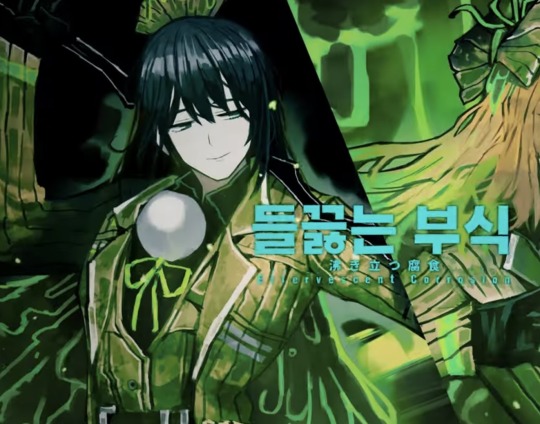
Keep in mind this ego is NOT out yet so i could be totally off base depending on what the full animation/corrosion/sin affinities are like and this is totally theorizing but I wanted to have a go at anyway!! And this got totally out of hand so reading is appreciated :)
One of the first things I noticed here is this Hong Lu seems VERY Bao-yu. We still don’t know for sure what Hong Lu is within the context of Red Chamber (i don’t think it’ll be straightforward considering how that book works) but it’s important to note!
He has this little hat on (this is the best pic i can get atm to show it’s not a fancy hair tie, unfortunately the footage we have rn is a little scuffed)
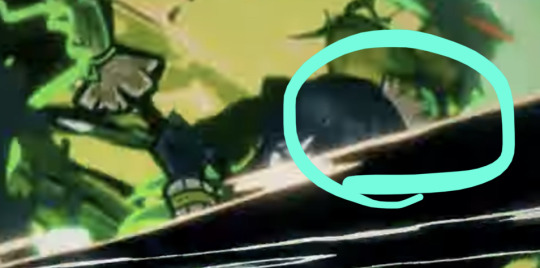
and Bao-yu is ALWAYS depicted with a hat like this.
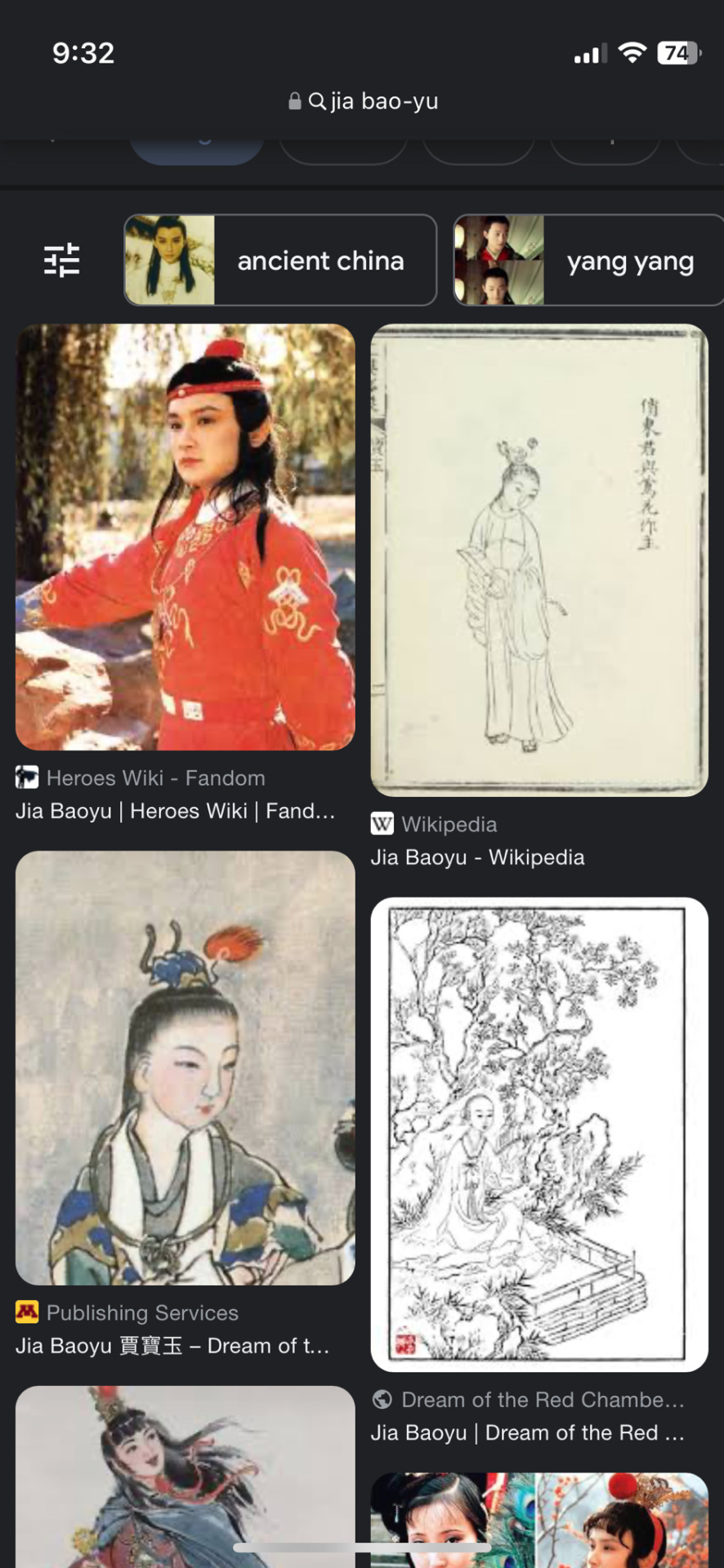
This could just be because that’s the appropriate outfit for Chinese nobility (I unfortunately have little to no reference point here, feel free to correct me, but from some quick searches hats aren’t ubiquitous and ESPECIALLY not ones of this style.) I think it’s worth noting because it comes up in nearly all modern depictions of Bao-yu.
There’s also the pearl Hong Lu is wearing on his neck/chest area, which is where Bao-yu wears the magic jade he was born with. His jade is translated into Limbus as Hong Lu’s jade eye, but this plus his hat and the abno’s themes REALLY makes me think we are dealing with some Bao-Yu stuff here.
Speaking of the Abno’s themes, now i can actually go over them! All we have for Walking Pearl right now is the MD event (as well as general observation), but there’s a few things that are relevant.
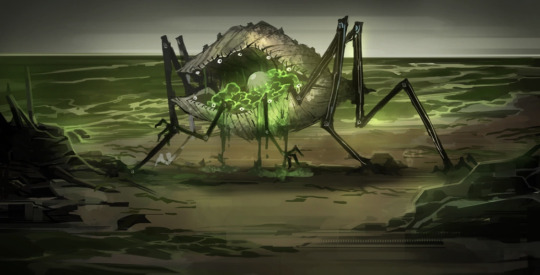
Just based off design, the abnormality seems to be mostly about the precious (the pearl) and the filth (the muck) intermixing. which makes sense with the EGO being named “Effervescent Corrosion” and our holders being Hong Lu and Rodya.
There’s some symbolism around greed/wealth (the offspring filled muck desiring the pearl and fighting for which one will earn it? the muck tarnishing the pearl? ) and I think we should read into that because it’s Hong Lu and Rodya who have this one and they’re both very tied to their financial status. Those two sharing an ego makes me insane for a bunch of reasons but that’s probably for another analysis piece! But duality is REALLY important for those guys and that’s a theme they’re emphasizing here with both the pearl and muck within the clam.
There’s also some elements of shelter/protection/potentially entrapment with the clam’s shell which are HUGE for Hong Lu, especially with his egos so I think those may come up.
But mostly it’s about the mixing of the precious (likely “wealth” here) and the unsavory, which works very well with what we know of the Jia family. The design likely referencing Bao-yu and thematically dealing with the Jia family makes me think each of those individual readings are more likely because they’re deeply tied together!
And now onto the MD event! I did not write this in order so I may repeat stuff here but. I realized I had to cover the design first so here we are!
First thing that stuck out of me is this portion when you choose to sample some of the clam’s slime.
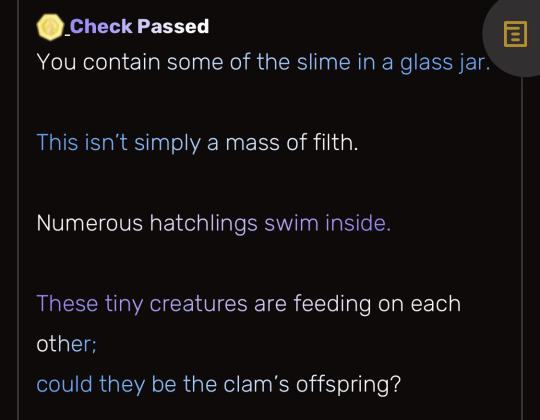
Sibling/family infighting is very Jia family. It reminds me a lot of this line base Hong Lu says.

You could take this a step further because the clam is something that would typically offer shelter from the rest of the world, and even though it protects, its offspring continue to kill and eat each other.
It seems fine, the offspring have this lovely shell for protection, and they have the precious pearl held within, but even as they are sheltered and wealthy. They are still getting killed and eaten by one another! Reminds me of someone I know:)
It reminds me of some bits in the later half of Red Chamber, where family members more obviously start acting behind each other’s backs or turning on each other, some even killing other family members.
Another part of the MD event that I got something out of was the beginning portion.
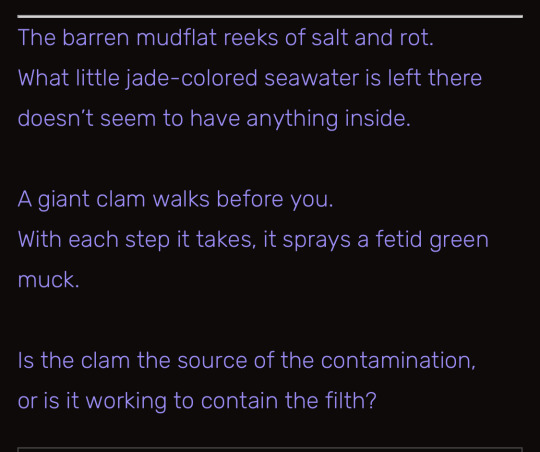
using specifically jade as the color for the seawater is a Hong Lu thing. I may be reaching with this bc it’s more than likely just flavor text BUT when taking this color with the fact that there’s nothing in the water it makes me think of an important scene in Red Chamber where Bao-Yu is described as an empty shell, so I wanted to mention it. We know Hong Lu has TONS of water motifs, especially when relating to his family (see his base ego)
The main reason I brought up this section of the MD event is because of the question brought up by the last portion.
If you take one thing from Dream Of The Red Chamber into your perception of Hong Lu as a character, it should be the themes of ambiguity, duality, and being between binaries. Because he sure as hell does that a lot!!! (and i’m not just talking about his gender) He is both genuinely curious and sheltered with an urge to learn as much as he can, but he also plays dumb frequently, backpedals and asks a lot of stupid questions on purpose to maintain others’ perceptions of him. He is CONSTANTLY walking the line between truth and illusion and it can be hard to tell which is which and precisely how much is fake or real, which is why I find him such an interesting character to think about.
Tangent about Hong Lu's characterization aside, it's really easy to read this line as about his family's perceptions of him.
Hong Lu (or rather, Bao-yu) can be read as being the source of the contamination in that he is the heir of the Jia family who is just an absolute fucking failure of everything you’d want in an heir for that time period.
The clam containing the filth can be read as Hong Lu’s lies (whether conscious lies or otherwise) to himself and others about the true “filth” of his family. Really good example of this is with another bit of window dialogue, but these lies and half truths come up quite a bit if you know where to look. (what happened to cohort of kin looking to stab each other in the back at every turn???)

We already have Hong Lu’s assorted water motifs (his feet make ripples on the water in his base id, land of illusion has so much water theming and shows the Jia mansion is surrounded by water) so I think this is a reasonable analysis to make :)
There’s some other sections to the MD event, but there’s nothing of note that triggered the Hong Lu sleeper agent in my brain & also this has gone on long enough that I wanna talk about predicting some stuff for the ego!
I am manifesting Gluttony/Gloom/Wrath for this ego!!
Gluttony and gloom are in the MD event’s skill check already and I think tie in nicely with the themes. Gluttony works with the offspring in the muck killing and eating each other and themes of greed with the pearl (plus the ego is primarily green and that’s a pretty good clue) and then gloom comes up a LOT with Hong Lu’s family (Liu Hong Lu, the only one that remarks on his jade eye, is also the only Hong Lu with gloom. land of illusion requires 5 gloom resources and also relates a lot to red chamber/his family) Gloom’s also generally a stand-in for water which exists here.
Wrath in Hong Lu generally manifests in him going “yeah, maybe my family was a little fucked up actually” internally, instead of manifesting as taking direct action about the fucked up things like it works for most other sinners, and acknowledging that his family was at least partially filth and killing and eating eachother (metaphorically. maybe literally) works for that
i am not an expert on sin analysis but i wanted to take a prediction bc it’s fun :)
I have a couple of predictions for corrosion and i’ll be real they are the main reason i wrote this thing because i LOVE when bad things happen to Hong Lu!!
Since this ego seems to be referencing Bao-yu so much i can pull stuff from Red Chamber too which makes it more fun :)
First one I came up with is Hong Lu taking the place of the pearl within the clam and getting locked in there! A bunch of his egos have to do with being controlled/trapped so i think it works and it also can work as a parallel for Bao-yu’s treatment by his family. Bao-yu’s name means precious jade, and he’s often treated more like his namesake than a person, heavily controlled and never allowed to leave the Jia mansion (or, in this case, the clam.) I just think it’d be fun!
My other concept has to do with more Red Chamber stuff, notably what happens when Bao-yu loses his jade. I’m not quite there yet in the text, but from what i’ve heard he becomes incredibly unstable and essentially loses his mind. This sets the Jia family’s downfall into even faster motion and from that point things get REALLY fucked up. Since the pearl here parallels Bao-yu’s jade, I think having a reference to that part of the book would be really fucking crazy for all 5 people who have read 1800+ pages of red chanber to get to chapter 94 where he loses that thing. Also i just want to see Hong Lu lose his mind i KNOW it would be terrifying and chilling. but they may be saving that for his distortion (manifesting)
In my skimming Red Chamber table of contents to find when Bao-yu loses his jade i just found a chapter where Bao-yu’s father admires a pearl but we will just ignore that for now bc this has taken long enough to type already and that is several chapters off. but there may be more analysis when this thing actually comes out!
Thank you for reading this far!! I hope you enjoyed me looking far too deep into an unreleased ego we know next to nothing about for fun! this took WAY longer than expected to type out but i’m glad I did because I loveee telling people about Hong Lu!
There is a very real chance very little of my analysis and prediction is reflected in canon BUT please remember that truth becomes fiction when the fiction’s true and even if this doesn’t turn out to be correct now u know a little more about Hong Lu and the themes he plays with :)
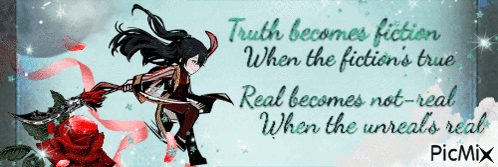
#limbus company#hong lu#hong lu lcb#limbus analysis#effervescent corrosion#analysis#limbus company analysis#my analysis#pachiposting#idk what tags people use!!! this deleted on me halfway thru and i type slow so weiting this was a miracle#i think i’m cooking here. i love analyzing#fighting for my life to upload the. ugly clam theory lore
235 notes
·
View notes
Text
The Elevator Parallels of Good Omens
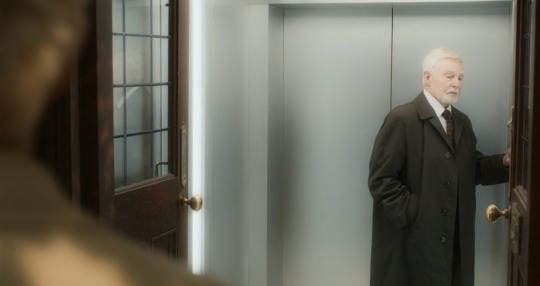
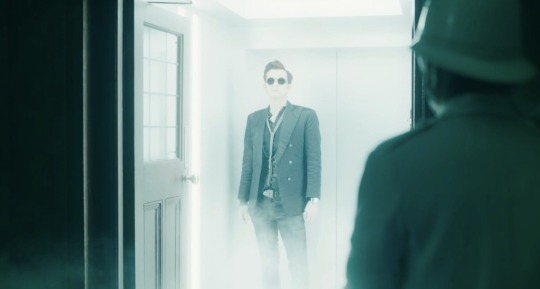
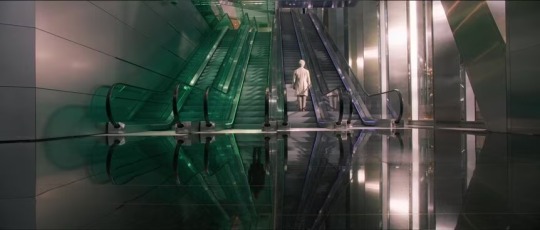
The coloring of each scene matched their respective characters. Crowley and Muriel on the green side and the Metatron with Aziraphale on the silver side.
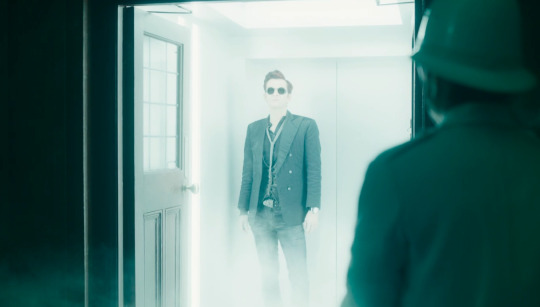
Crowley’s Perspective: He is on the right side of the elevator. He is looking at Muriel who is on the left. They are also in a shadow and Crowley is in the light. Crowley is wearing black. He is being “arrested.” He is going willingly to Heaven. He is going to look for information and presumably bring angels as back up. He has manipulated Muriel into taking him to Heaven so that he can save Aziraphale and the bookshop. This also happens in the evening and the middle of the night. Time seems to move differently on Earth versus Heaven. It’s early morning by the time that Crowley comes back to Earth even though it looks like night when he leaves. This also could be due to the demons messing with the atmosphere.
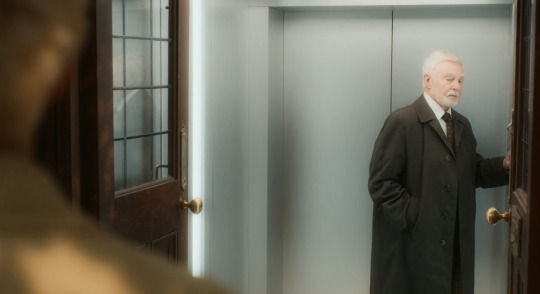
The Metatron’s Perspective: He is on the left side of the elevator, partially in shadow. He is looking at Aziraphale who is only partially covered in shadow and on his right. He is wearing all black. He is the one bringing Aziraphale to Heaven. It is early morning.
The Metatron and Crowley’s similarities: Besides the where they are standing and their clothing, both of them are high-ranking individuals(at least one of them, Crowley seems like he might be high ranking but that hasn’t been confirmed in the show. He might just know stuff because he’s nosey.:-) who are entering Heaven with a “naive” angel. They both have more knowledge than the angels in front of them. Crowley manipulates Muriel to get into Heaven. The Metatron seems to be manipulating Aziraphale as well, but here’s where they start to differ.
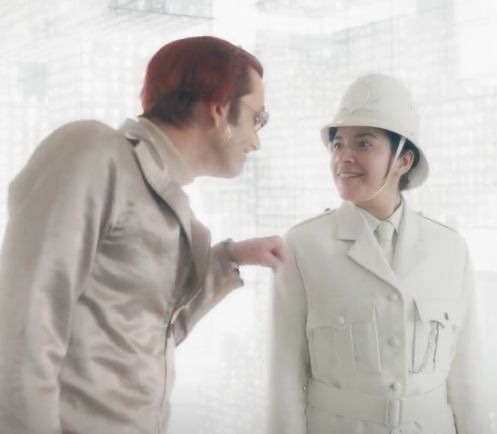
Muriel does not really understand what is happening. They are shown to be easily manipulated by a higher power, but they also think that they could be doing the right thing. They like Aziraphale and they don’t understand exactly how he is a “traitor.” Most of this shows how they are learning and changing from being on Earth with humanity and specifically Crowley and Aziraphale. They’re so excited when someone “acknowledges” that they’re doing a good job. A big part of this is because they have been by themself for centuries or longer. They didn’t have a lot of chances for social interaction so they’re not great at it.
The Metatron manipulates Aziraphale into taking the offer that he presents. This assumes that Aziraphale does not understand the choices at hand, but he does. He has been on Earth around humans who are known for being manipulative for 6000 years. His job has been to steer those particular humans into being better for a very long time. Aziraphale's best friend is the demon who is literally known for teaching humanity how to manipulate. I think that he would know when he is being manipulated and very obviously threatened. Especially after the 1940s incident.
I theorize that the shadows are showing how much they know about the situation they are in/going into. Crowley is covered in light, because he knows that he is walking into a very dangerous place to obtain information that itself is dangerous. It also shows that he is really curious. He wants to bring wriggling things into the light with him. Muriel is in pure shadow, because they do not know what is going on, and they’re scared which makes it harder to be curious. The Metatron is in partial light. He knows everything about Heaven and his plan, but he is underestimating Aziraphale specifically in this moment. He is curious what Aziraphale will do, but he’s being cautious. Aziraphale is in both shadow and light with leaves making it “holes” like holes in his knowledge. He does not have all of the Metatron’s knowledge of the situation nor do we. However, Aziraphale does know what it is like working for Heaven and how the angels can be. He had just learned about the Book of Life(and the owner) then the Metatron takes him away and gives him a thinly veiled threat. Aziraphale chooses to go believing that he can change things as Supreme Archangel(trying to convince Crowley because he thinks it would be safer if they’re together and he loves him). After, he learns about the Second Coming. Now, he’s got to stop another Armaggedon and maybe a revolution would help

#good omens#good omens 2#aziraphale#ineffable husbands#good omens spoilers#go2#crowley#good omens speculation#michael sheen#david tennant#theory#go 2 speculation#meta analysis#good omens meta#hope this makes sense
116 notes
·
View notes
Note
god youre so right about the dream writing getting more "polished" im not sure if you talked about this yet but do you think Silver is in trouble with how much magic hes using + the number of people hes transporting dream to dream? like honestly Im worried for him
[You can read my thoughts on the book 7 chapter 12 part 2 update here!]

For real 😭 I mean, I still have several major problems with the dreams (like how the pacing is off, how the characters waste so much time standing around and talking about their personal lives when the world is in peril, how they have a very set pattern especially when it comes to the OB boys, and how the dream logic keeps overcomplicating or contradicting itself). However, the character writing has drastically improved for some Savanaclaw and Heartslabyul dreams. Leona, Jack, and Ace’s dreams were very meaningful. Ruggie, Cater, Trey, and Deuce’s dreams had their moments as well, even if they were sillier overall. I largely found the Octavinelle and Pomefiore dreams to be dull or time wasters, Ignihyde’s (Idia’s) and Scarabia serviceable, and Diasomnia’s (Sebek and Lilia’s) good but Lilia’s was too long and Sebek’s was too short.
I too was at first confused about how often and how easily Silver is able to dream hop (something I had expressed in this post), but I honestly don't think anything will come out of it, even if it's fun to theorize. Silver states in book 7 that his UM doesn't take much to use. On top of that, Mr. Shroud (or was it Mrs. Shroud, I forgot but one of them for sure) theorizes that the mages that are resting are recovering the magic they use in their dreams (since technically sleeping helps mages recover from blot accumulation). So I think it's supposed to be a combination of these factors (although fans have suggested other ideas too) that explain away why no one is worrying about Silver's wellbeing this late into the dream hopping. Again though, his UM is probably designed this way as a plot contrivance to justify how he's able to visit so many dreams. In the most recent JP main story update, Silver mentions the limit he can handle when using his UM is ~10 bodies. He has just reached that cap (himself, Sebek, Yuu, Grim, Ace, Deuce, Cater, Trey, Ortho Leona; Idia is also there, but he is present via his tablet while his actual body remains elsewhere so I'm not sure if he counts). At the end of Trey's dream, it seems that they're able to leap into Riddle's dream just fine so I don't think there's really an issue.
#twisted wonderland#twst#disney twisted wonderland#disney twst#book 7 chapter 12 part 2 spoilers#Savanaclaw#Heartslabyul#Octavinelle#Scarabia#Pomefiore#Idia Shroud#Sebek Zigvolt#Lilia Vanrouge#notes from the writing raven#question#Silver#book 7 spoilers#Yuu#Grim
98 notes
·
View notes
Note
Just going to drop some theorizing that my friends and I have been doing in GC over elriel especially since there were question in a previous AMA i think you might love this.
it's come from late night tumblr stalking and wild conversations so you might have heard some of it already because it's not completely original. i'll try to say all sources to give credit
theory from highbabyofthenightcourt:
(she went on to talk about the book of breathings and found a quote)
and this one quote which made sense to me
"life and death and rebirth" -feyre coded
"Sun and moon and dark"- nesta coded
"Rot and bloom and bones"- Elaine coded
hello sweet thing, hello lady of the night, hello fanged beast and trembling fawn. Love me, touch me, Sing me.
her theory is that there is three phases to connect to the sisters
feyre's journey was to find love, not just for rhys but for herself and for life "love me"
Nesta's line "touch me" could be an indicator of how she reclaimed her body through touch, through connection. (WHICH WOULD EXPLAIN THE SEX FILLED BOOK!)
(Elaine's comment kind of confuses me because for one it says "Hello fanged beast and trembling fawn" is it talking about just elaine here? because she did use azriels shadows. is she part of him and he is of her? or is she secretly also a fanged beast.) but she eludes this comment of "sing me" could be linked tot he shadow singer! we have no way of knowing until the book is out
life, death, and rebirth:- feyre (human, death, fae)
sun and moon and dark- nesta ( sun could be rage, moon could be pain, and dark could be atraxia)
rot and bloom and bones- Elaine (rot of her old self, bloom into something new and bones we won't know until the next book.)
now onto soemthing i just happened to notice myself from reading a depiction of when Elaine was rescued by Ariel. there was a huge foreshadow in the description alone.
the comment consisted of this "the two of them having to be physicaly seperated by Rhys"
it brought up the thought this is exactly what happened in the bonus chapter. rhys had to seperate them.
then i realized "who is azriels biggest obstical for the next book?"
it's his own high lord. his loyalty and love to his own brother.
who was luciens biggest obstacle? his own highlord, and suffice to say he did not do well in holding his own and standing up against him which in turn led to the event of elaine being turned.
how would elaine ever want a spineless mate?
i think azriels test to overcome will be going against his hgihlord and having a spine. it connect rhy's villianous behavior becoming more apparent rhought the books and sets up the motions for us the readers to relish and revel in his humbling.
i think azriel will show elaine he is not lucien and will not just follow whatever orders he's given at the detriment to other people.
Hey 🫶
oooh im always down to talk about elriel theories,
starting from, “fanged beast and trembling fawn” - I think this could be referring to Elains powers. “Trembling Fawn”

As for “fanged beast” - either Elain can shapeshift which was potentially hinted at in acofas when she asks Amren about choosing her body, or a more unrealisticc crack theory approach is that each Hl has a beast form. If Elain is the one to revive Dusk and become a ruler off it - then wouldn’t she also be given a beast form like the other Hls? It could also be metaphorical. Elain has two sides - the sweet, gentle, gardener Elain and the savage Elain will do whatever it takes to save the people she cares about such as kicking the hounds of Azriel, warning Feyre about Tamlin and stabbing Hybern in the neck for Nesta - all acts one may not have expected from someone like Elain.
As for the line, “love me, touch me, sing me” - this I believe is how each sister needs to feel loved or communicate their love. Rhys showed Feyre true love, Cassian and showed their passion/love through physical touch and as for elriel, sing me could be how Az shows his love for Elain - Ik there’s some theoried of Elain “dying” and Az will be the one to bring her back, in some mythologies this can be done through singing a song to a God and pleading them for their lovers’ life.
Good catch, in acowar - Rhys is the one that takes Elain off Az. And in the bonus he again, seperates Elain and Azriel. Now again, you can look at it metaphorically. Rhys representing a higher power that separates Elriel - maybe the cauldron. Potentially Koshei.
Omfg I love this parallel. Lucien couldn’t stand up to Tamlin, even for his mate - he was still by Tamlins’ side in acowar and only left when Feyre was going. He didn’t take initiative or do much, wanting to see if she was worth 🤢 fighting for. Yet w Azriel? “You can’t do that” - said to Rhys when he immediately pulled rank. Azriel deciding to go against Rhys and be with Elain will be a huge moment (I dont think they’ll have a secret or on going private relationship) something Lucien couldn’t do. And I think for Elain it will a significant moment too, someone wanting her so much they’re going against their HL. She means *that* much to them. Two characters choosing each other over power.
27 notes
·
View notes
Text
THIS IS HILARIOUS!!

You make a reblog and then block me so I can't respond. 😆 💀
Tell me you have no leg to stand on without telling me you have no leg to stand on.
In one of SJM's most recent interviews. She says her plans from the beginning haven't changed. So I can go back to previous interviews she's done and her old Pinterest, because they still matter. You can ignore Sarah J Maas and her narrative but I won't.
A FREE bonus chapter that you can read online is a money grab 😆
I'm sorry for the non English readers, but the bonus chapter is canon, just because you didn't like it. Or some people haven't read it, doesn't make it not true..
When the author says she left breadcrumbs in the BC and we get mating terminology for Gwynriel. That makes it very real.
Debunked?? I'm laughing my ass off at this! Because Elriels haven't debunked shit.
All Elriels do is come up with convoluted theory after theory. No actual evidence from said books you claim to know so well.
Saying Gwyn is a lightsinger who lured him there is not debunking. It's a theory, so you can gaslight yourselves even further.
Theorizing and debunking aren't the same thing 🥸
Actually when Cassian mentions Gwyn's name after they're taken. His shadows darken and It's the first time in the entire series that he stuttered. Which is a reaction for a composed spymaster.
You are right, it's unsinkable. Because it can't sink any deeper.

Lucien thinks more of her than just as a mate. He sees that she likes to garden so he gives her a gift that fits her hobby.
So giving Elain space is now a bad thing? What did you want to throw them both in a house together and lock the door?
Because he's not forcing himself on her like Cassian did to Nesta he must not care? Even though he blushes and sends her longing looks.
Elain calls NC home and then pages later Cassian goes on and on about how Elain looks terrible in black. However later she changes into an amethyst dress which fits her better. Amethyst just so happens to be a Day Court color.
And you can't tell me Sjm doesn't use colors for symbolism, when she most certainly does.
She wanted sex from Az. And Nesta wanted sex from her many males.. There's no romance there, Elain gave her gift back. Which is a form of rejection. Fun fact, she still has Lucien's gifts.
Going to another Court isn't leaving your sisters. It's the equivalent of going to a different city. Especially when they have magical transportation.
I also won't be turning comments off like a little bitch.
Xoxo 😘
56 notes
·
View notes
Text
Webcomics at Day 100 #10: The Order of the Stick
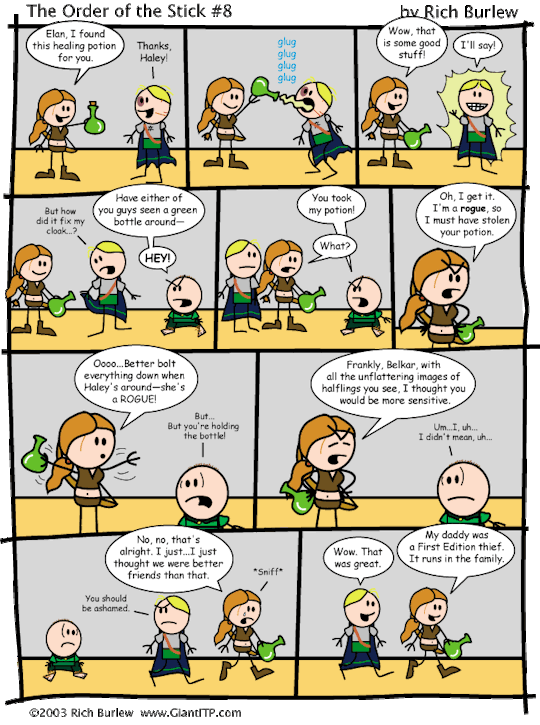

Pages read: 9/25/2003 – 4/4/2006 (books 1&2; 301 full page strips)
Reason for selection: D&D is really important to nerd culture (and online culture since 3e), and this is probably the most popular and longrunning D&D webcomic, to this day loved, followed and theorized on by a large fanbase.
Current status: Ongoing with no set schedule, averaging twice monthly updates. Creator Rich Burlew says the current book will be the last, but fans predict the arc will not end until 2031 or later.
Content warnings: frequent misogyny, sexualization of female characters, equating sex and gender, occasional transphobia, sexual humor, occasional jokes about sexual assault and harassment, one joke about slavery, extreme amounts of cartoon violence
Overall thoughts:
I am definitely the target audience for Order of the Stick. As a long time D&D player who also enjoys hearing about games I didn’t play in and likes webcomics as a medium, it’s not surprising that I fell in love with this very quickly, because I’m the exact type of person it’s being written for. As such, it’s hard to analyze whether it’s easy for non-D&D players to get into.
D&D references appear in the majority of strips, typically to 3.5e – the edition released shortly before the comic’s debut, which almost entirely dictates the characters’ abilities and the rules of the world they live in. Most references are still relevant to more recent editions, and the comic riffs on random encounters, initiative order, attacks of opportunity, momentary in-game retcons after remembering an extra feature or skill bonus after the fact, timeskips during travel, rogues stealing from party members leading to intraparty conflict, the ‘all PCs have dead parents’ backstory stereotype, and especially alignment.
The entirety of book two, ‘No Cure for the Paladin Blues’ (so named because it features a paladin dressed in blue), explores alignment in more depth than the occasional jokes surrounding the other topics. Roy, an honorable leader who has sworn an oath but isn’t a paladin by class, and Miko, who is a true paladin and follows her order’s rules to the letter, come to blows over the meaning of ‘good’ and ‘lawful’, whether intent or outcome determine a person’s alignment, and what it means to live in a world where alignment is objective, codified, and detectable. These are ideas that later D&D editions will also question, but not as efficiently as secondary character Celia, a sylph defense lawyer, does in a literal courtroom scene in comic 282.
The D&D references range from these blatant ones, to the more subtle. To zoom in on a moment I loved, strip 214 features a moment where Miko – a party ally, who would be controlled by the DM in a real game – goes against the party’s planned stealth ambush and barges into an ogre camp to confront the leader. This would be really bad D&D etiquette in most games, as a DM would be taking agency away from the players, not allowing them to even attempt a plan they’d worked hard on. But it works well as comic writing, because it characterizes Miko and sets up a new three-way conflict between her, the party, and the ogres.
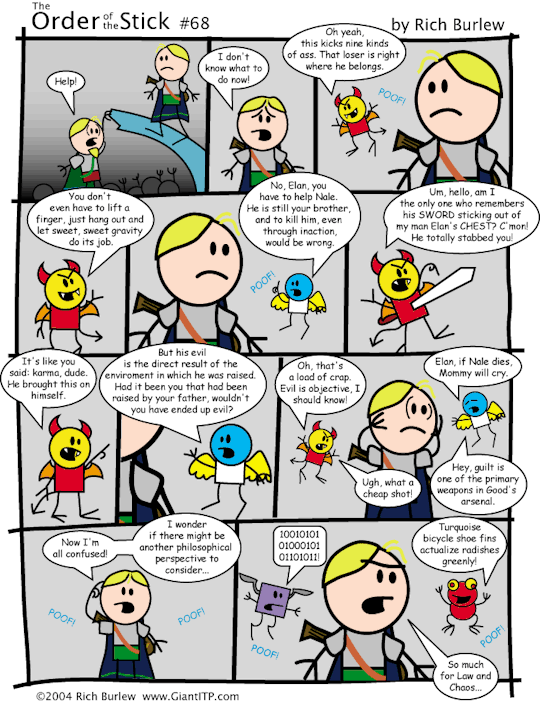

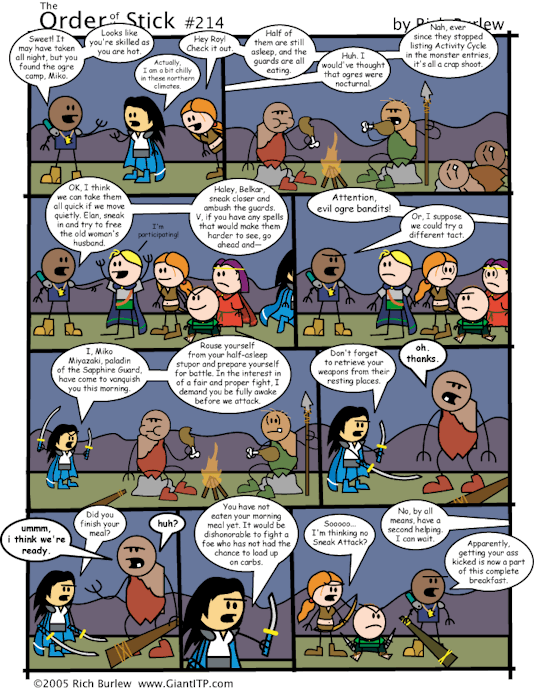
Establishing characterization is much easier with D&D ability scores and spell lists to lean back on, but Burlew has never made official character sheets for the party to allow the story to come first. Instead, Burlew uses common player character archetypes – a respectable human fighter/party leader avenging his father, a Scottish dwarf cleric who likes ale and can’t roll stealth, an androgynous elf mage who prefers learning about the limits of arcane potential to social interaction, an annoying, pretty, constantly singing and talking when he shouldn’t bard (who surprised me by being dumb instead of horny), a treasure-obsessed crackshot rogue, and a chaos gremlin. XP and level up mechanics provide an easy, in universe reason for characters developing new powers.
I found most characters quickly likeable, except for the chaos gremlin – halfling ranger Belkar is the party’s evil member, generally played for comic relief. However, as the overarching plot is introduced as early as strip 13, and other characters are given two dimensions and ethical beliefs within the first hundred strips, Belkar’s being loved by the party of relatively decent people despite his selfish, violent and amoral actions (stated outright in strip 285) feels out of place and unearned to me. His misogyny and sexual harassment of female characters, also played for laughs, really contributes to this – it’s hard to overlook, especially as it’s reflected by the author.
Burlew falls into common pitfalls when writing female characters – for example, a woman only being taken seriously when she is competent and can out-perform the men, a man needing to experience being treated like a woman in order to respect one, and regularly referring to women as ‘bitches’, ‘whores’, and ‘chicks’. In 2015, Burlew said that he has few regrets about his early work, but that they include ‘[u]nintentional sexism and/or insensitivity to gender issues. Doing my best to fix it going forward.’ This acknowledgement is important to my decision to keep reading.
[Note on next paragraph, added later: I have now been informed that Vaarsuvius is canonically genderqueer, confirmed later in the comic! huge win for representation and on Burlew incorporating reader feedback & thanks to the anon who let me know!!]
Against all odds, the wizard of unspecified gender Vaarsuvius is actually written fairly well. The ambiguity is often treated as a joke, and minor characters will sometimes assume their gender one way or the other – but the other main characters don’t know and are okay with not knowing. They’re respectful and don’t question it when Vaarsuvius doesn’t use the gendered dungeon toilets, and while Vaarsuvius shares a room with female party member Haley at inns while the men all share a second room, strip 225 makes it clear that this is because Haley and V are good friends, not because they share a gender. (As a sidenote, Haley and V’s sweet and unlikely friendship is my favorite dynamic in the comic).
Artistically, the characters are drawn as stick figures (as represented by the comic’s title) with clean lines and bright colors in strips that are typically one A4 page. The first OOTS book was printed in February 2005, with further books released after each major story arc, so Burlew has written the bulk of this comic knowing that it will be collected in print. Likely, this influences the decision to mostly stick to the A4 style, and rarely include oddly shaped strips, animation, hyperlinks, hover text, or other web-specific elements. Important story beats and milestones do see extra-long strips, with the 200th strip covering a long-foreshadowed battle four times as long as a regular strip – with white space indicating the page breaks. Strips may play with panel order while keeping the A4 format, such as comic 242, which uses arrows to indicate that panels should be read vertically, not horizontally.
Character designs are extremely recognizable from the first strip, and the art style gets slowly more complex – while the stick figures remain, backgrounds grow more detailed and shading is introduced over time. With the early strips, the art in print books is (allegedly) an improvement over the web versions, an incentive to buy print copies when the full archive is available for free online.
Most characters speak in white speech bubbles with black text, but there are exceptions – core villain Xykon the lich has black speech bubbles with white text, creatures of pure light have yellow speech bubbles, sylpha and ghosts have blue, and a bastion of lawful good order has red. Lowered opacity speech bubbles with dashed outlines indicate whispering, and (in a more questionable choice) bold lower case speech indicates a character has low intelligence. The different colors are effective at making characters from other planes feel truly alien, and the importance of the speech bubbles reflects the wordiness of the comic – the text is small, speech bubbles are often paragraphs, and even zoomed into 150% I ended up with a bad screen headache after a couple hours’ reading, which makes an archive binge much harder.
OOTS has a reputation for beginning as humorous and becoming more serious and story driven in its third and fourth books. I haven’t reached those yet so can’t compare, but I already find that while jokes are frequent, the story takes precedence when necessary – and like other comics I’ve read, even Burlew seems surprised at how quickly the strip becomes something beyond its original intentions, letting a character say ‘Wow. That’s a lot more planning than I thought this strip had’ as early as strip 60. However, he also says that having the characters leave the dungeon and take on a bigger quest in strip 122 was partly because he ‘was leaving a lot of good jokes on the table by never having them go to town or on a wilderness adventure’, so the ‘plot driven’ and ‘joke focused’ drives are coexisting then. I’m really excited to see how the tone and story develop over the next thousand strips. :D
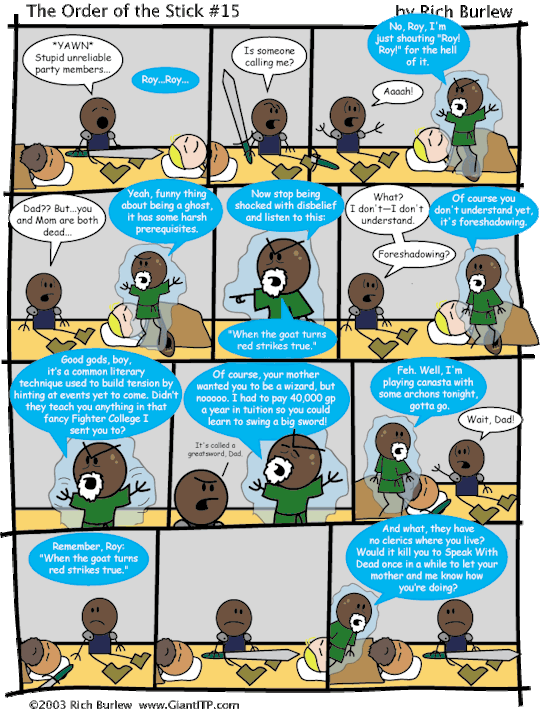
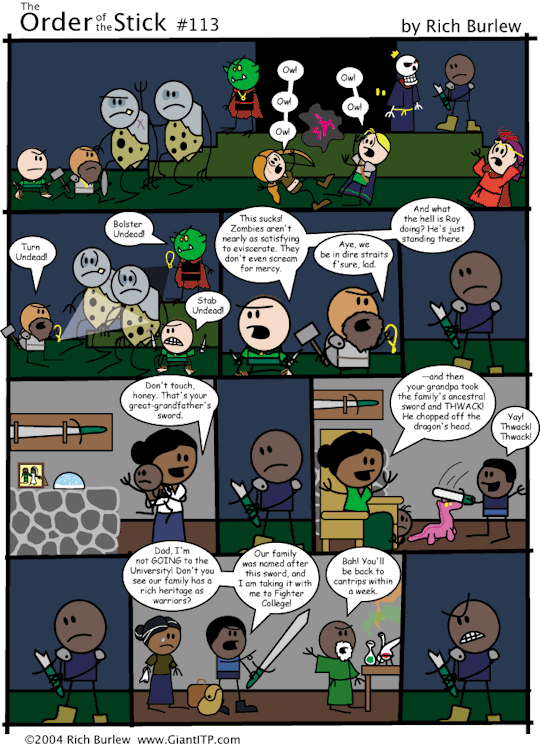
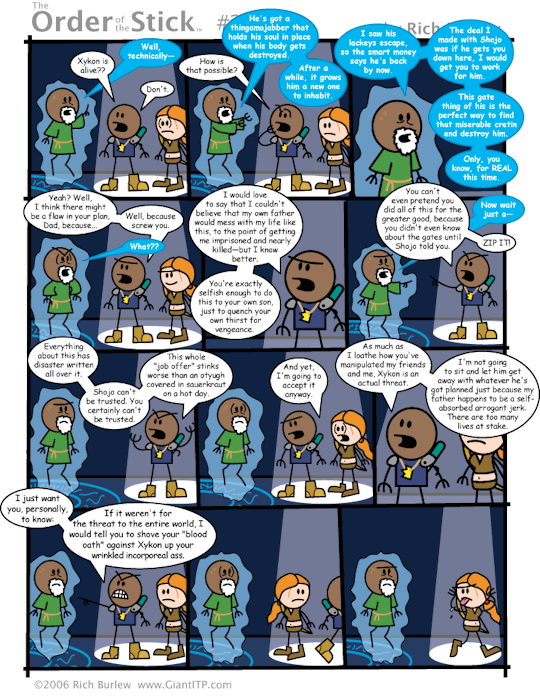
Relevance to Homestuck:
As best I can tell, there’s no official connection, though there is fanbase overlap. I’ve said before that Homestuck is a precursor to actual play podcasts, and plan to write more about that someday. In its case, Andrew Hussie clearly acts as DM with the command-submitting readers acting as players; D&D mechanics aren’t used, but the dynamic is spot on.
In Order of the Stick, the characters referencing movies, modern slang, current events and 21st century professions is extremely reminiscent of real D&D play, as this sort of humor is common to both regular D&D groups and actual play shows like Acquisitions Incorporated and The Adventure Zone. A pair of lawyers sent by ‘the spooky wizard who lives by the coast’ are introduced in strip 32 and become recurring characters, a reference to Wizards of the Coast, the real world company who owns D&D. The same is true of characters mentioning exposition, sidequests, plotlines, character mirrors, and other concepts that D&D players know about, and therefore put into their characters’ mouths in games.
OOTS characters feel like they have players and the strip captures the experience of the gaming table really well, but readers don’t have much influence, and Burlew is taking on all roles. This is true even when they contradict, like in strip 21, where the character’s actions of killing a chimera go against the DM’s plans to have him be a recurring villain.
Like Homestuck, OOTS begins as a fairly small scale story – taking place in a single dungeon – but expands within a couple of years to include threats not just to the world, but to the very fabric of reality. In a couple of very minor parallels, both feature the dunce cap (HS 746/OOTS 14), the 8 ball (HS 804/OOTS 127), and a plot important meteor (HS 196/OOTS 134). Meteors seem like a surprisingly common feature of webcomics, actually, and I wonder if this was a big part of 2000s culture that I don’t remember. OOTS has a minor character, Banjo the Clown God of Puppets, who appears in several strips including 80 (regular Banjo) and 85 (as the eldritch Banjulhu). His mysterious and unsettling appearances are reminiscent of Lil Cal, and his tentacles of Rose’s eldritch doll. I could also discuss Kickstarters here but I think I’ll save that for a few years down the line.
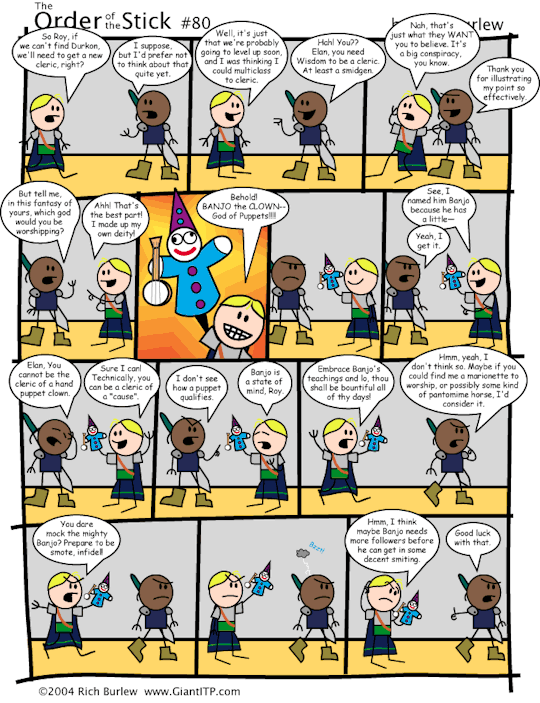
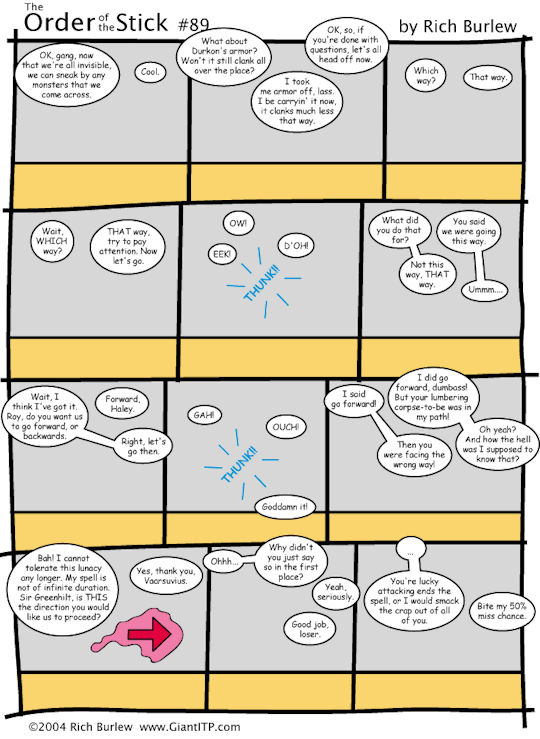
Scholar Gabriel Romaguera wrote his master’s thesis and part of his PhD thesis on Order of the Stick. I’ve read his master’s thesis in full and really enjoyed his analysis, which is far more comprehensive than my own (though as a sidenote, I do genuinely hope to write a master’s thesis on Homestuck someday). He’s only one scholar, but a lot of his analysis links up with the limited Homestuck analysis I’ve read. Romaguera discusses serial vs archival reading, web vs print versions, and whether the OOTS books can be considered a webcomic.
‘Some of the material is only relevant when read within twenty four hours of the original publication... Readers are supposed to wait for new installments, read them, go over to the forums, reread them to make sure th+at no detail was left unnoticed, speculate what would happen, and continue to wait until the new issue is published and then the cycle continues. This process makes for a deeper connection to the narrative and to the characters as years go by.’ (Romaguera, p.138)
This argument is presented uncritically and unproductively, just as it has been by many Homestuck analysts. While it’s technically true for any serial work, it becomes more true when participation in an active fan community of theorizers, proofreaders, lorekeepers and fanwork producers is seen as critical to understanding the work. From some time browsing the forums, this is definitely true of both OOTS and Homestuck moreso than other webcomics. (It’s also the attitude that made my lab scientist brain go ‘okay, cool theory, but have you tested that experimentally?’) Romaguera goes on to say that ongoing webcomics could be taught in classrooms when teaching students about serial narratives as ‘[t]he serial reading experience is often taught in hindsight and with nostalgia that suggests that current readers have missed out on the original text as it was intended to be read.’ (p.151) I agree and I love this idea more than words can say.
‘This effectively makes OOTS an ongoing trans-media narrative, wherein some parts of the narrative are exclusive to one medium, and some parts are exclusive to the another one [sic]. Readers go through the process of piecing these parts together to make this third text and thus fully attain the narrative. Still, this practice only goes on until Burlew publishes the final book and all of the narrative is collected in one authoritative text.’ (Romaguera, p.139-40)
In most webcomics (including Homestuck), print editions are supplementary, collector’s content. With OOTS, it seems like both the author and fans give the print editions a lot of importance. Once OOTS is no longer serialized, it does seem likely that the print editions, which include entire books of bonus material not found online, will be seen as fully definitive. Similarly, I would call The Unofficial Homestuck Collection the definitive edition of Homestuck, due to its functional flash player, wealth of supplemental content, and options for reading spoiler free. Ultimately, both these works have transcended their original websites in a way few webcomics have.
Continue reading? I think this is my favorite webcomic I’ve read for this subproject so far. I usually would’ve read 2009 strips for a comparison, but didn’t, because I want to experience the story linearly without spoilers. I could get totally obsessed with this. I want to make D&D character sheets for the beta kids.
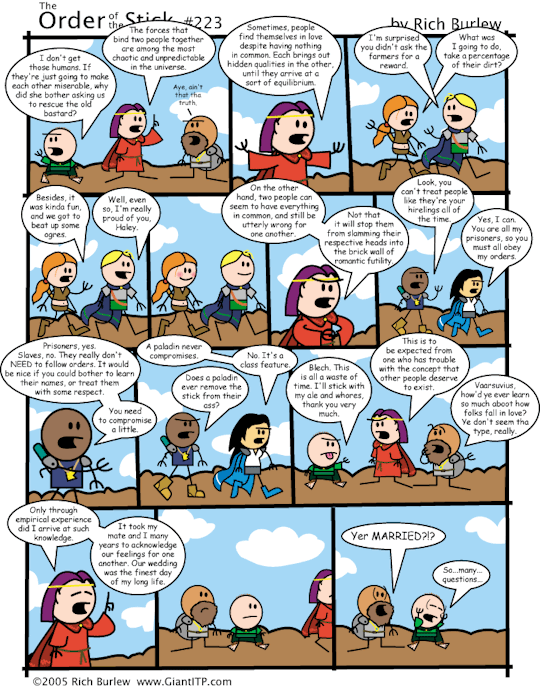
#webcomics 100#order of the stick#oots#dnd#order of the stick replay 2031 to 2059 (NOT doing this)#chrono
20 notes
·
View notes